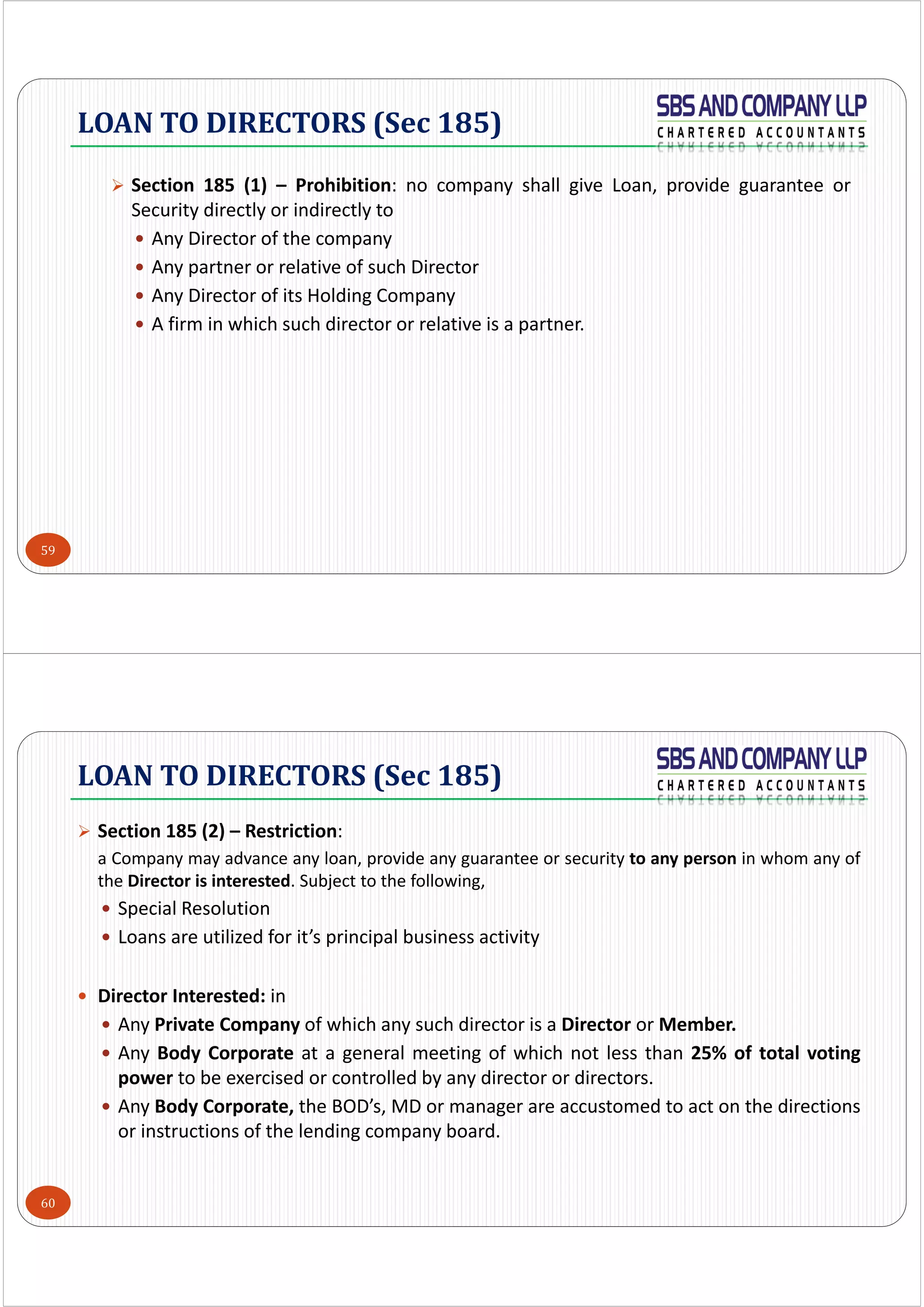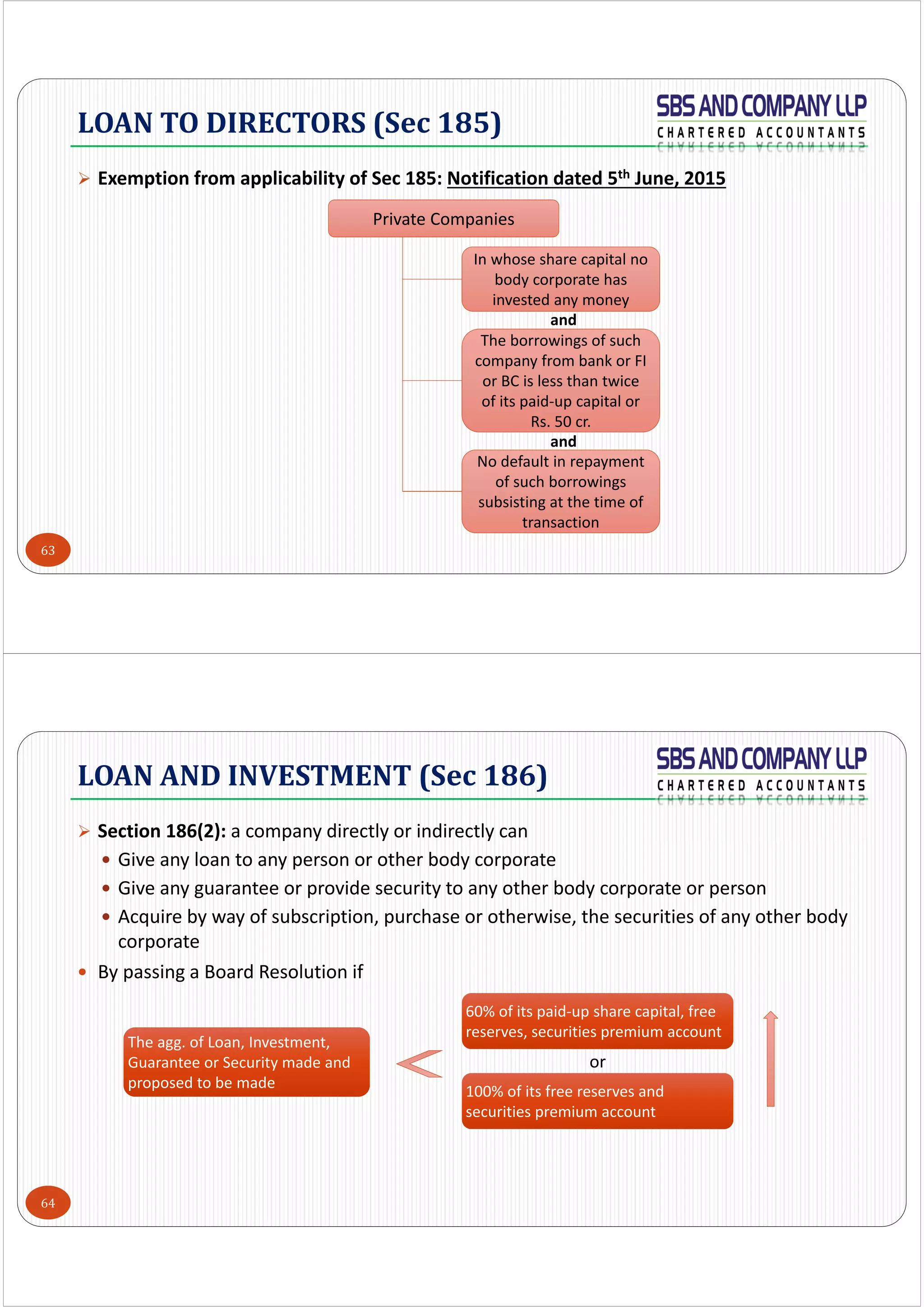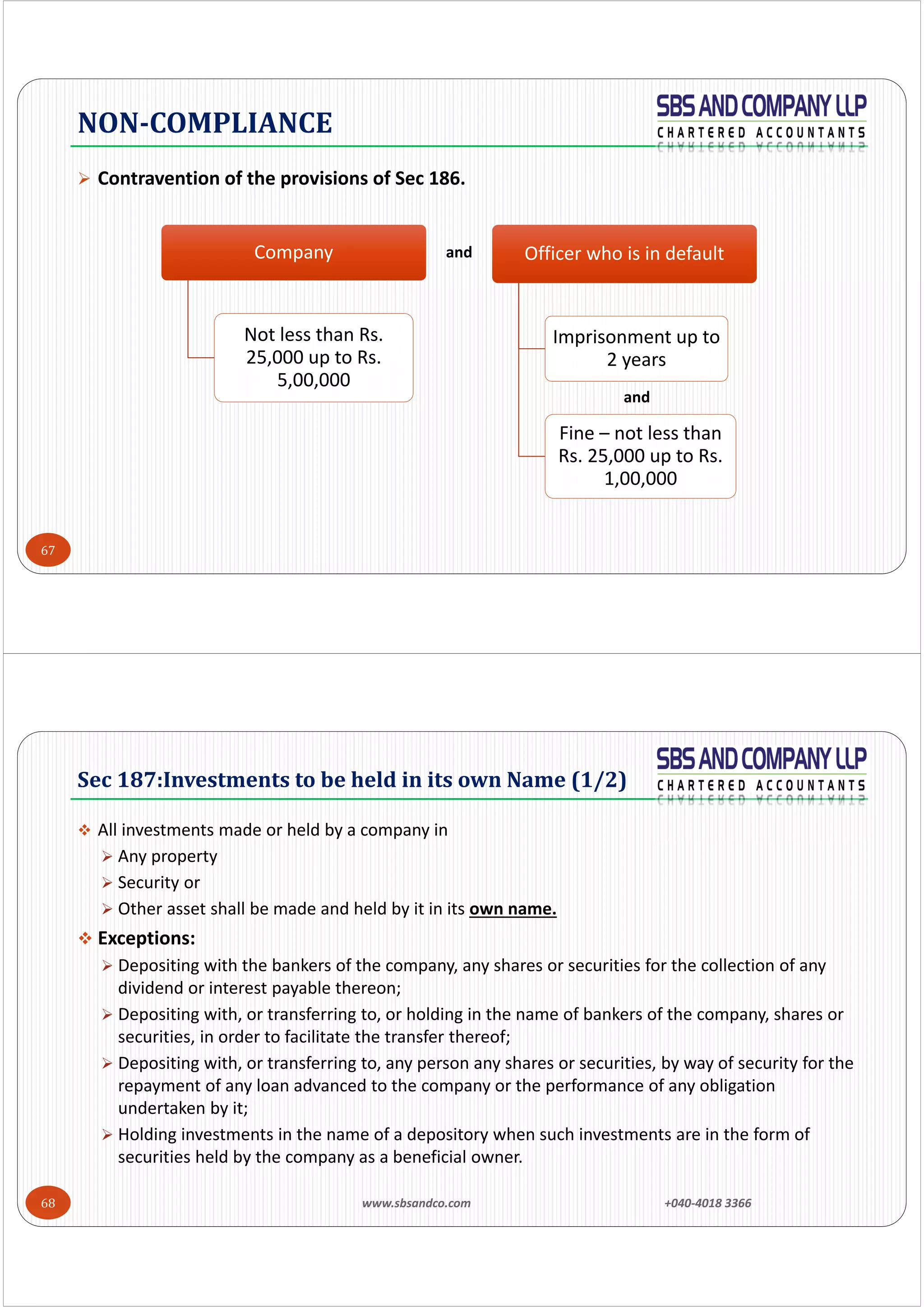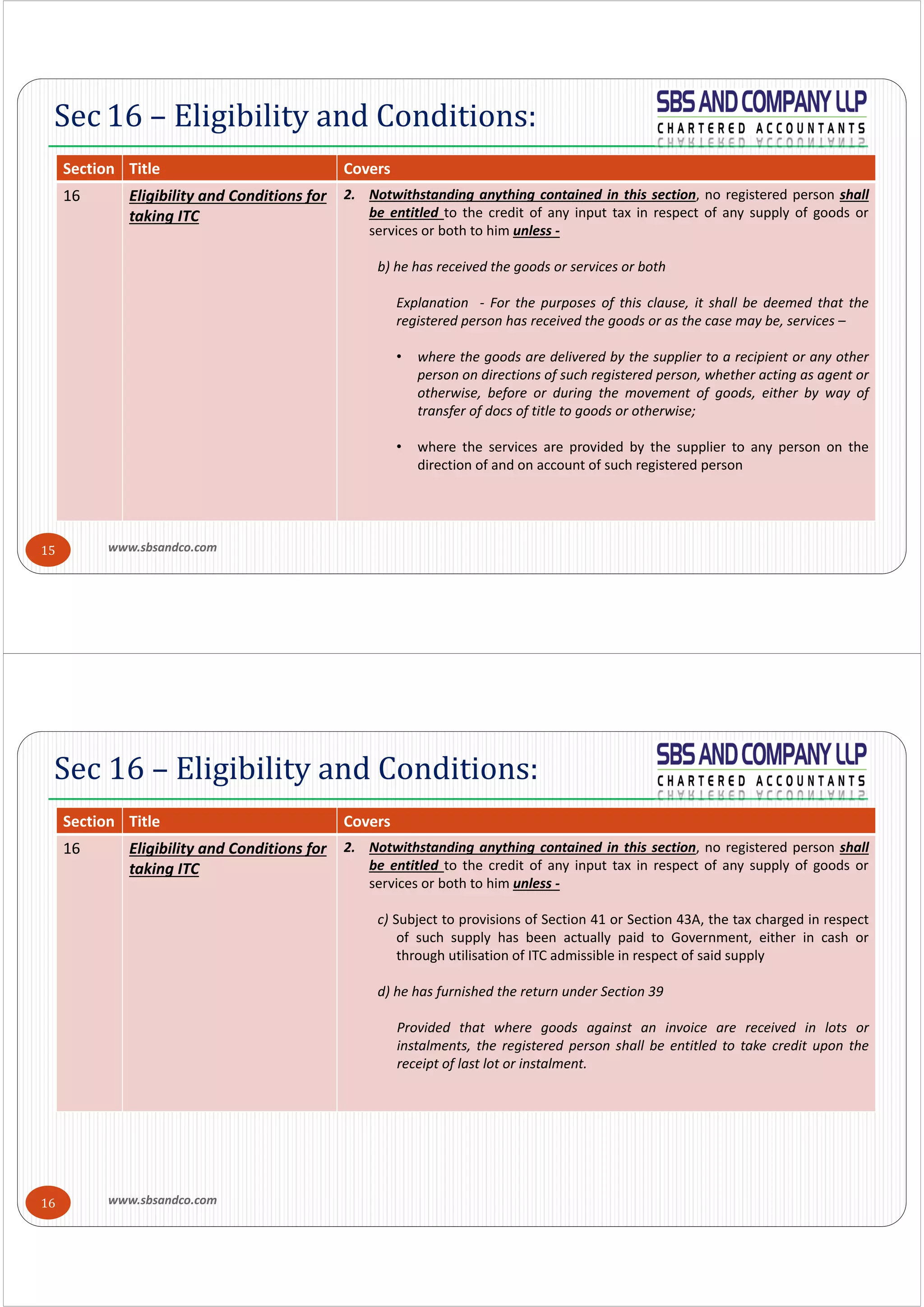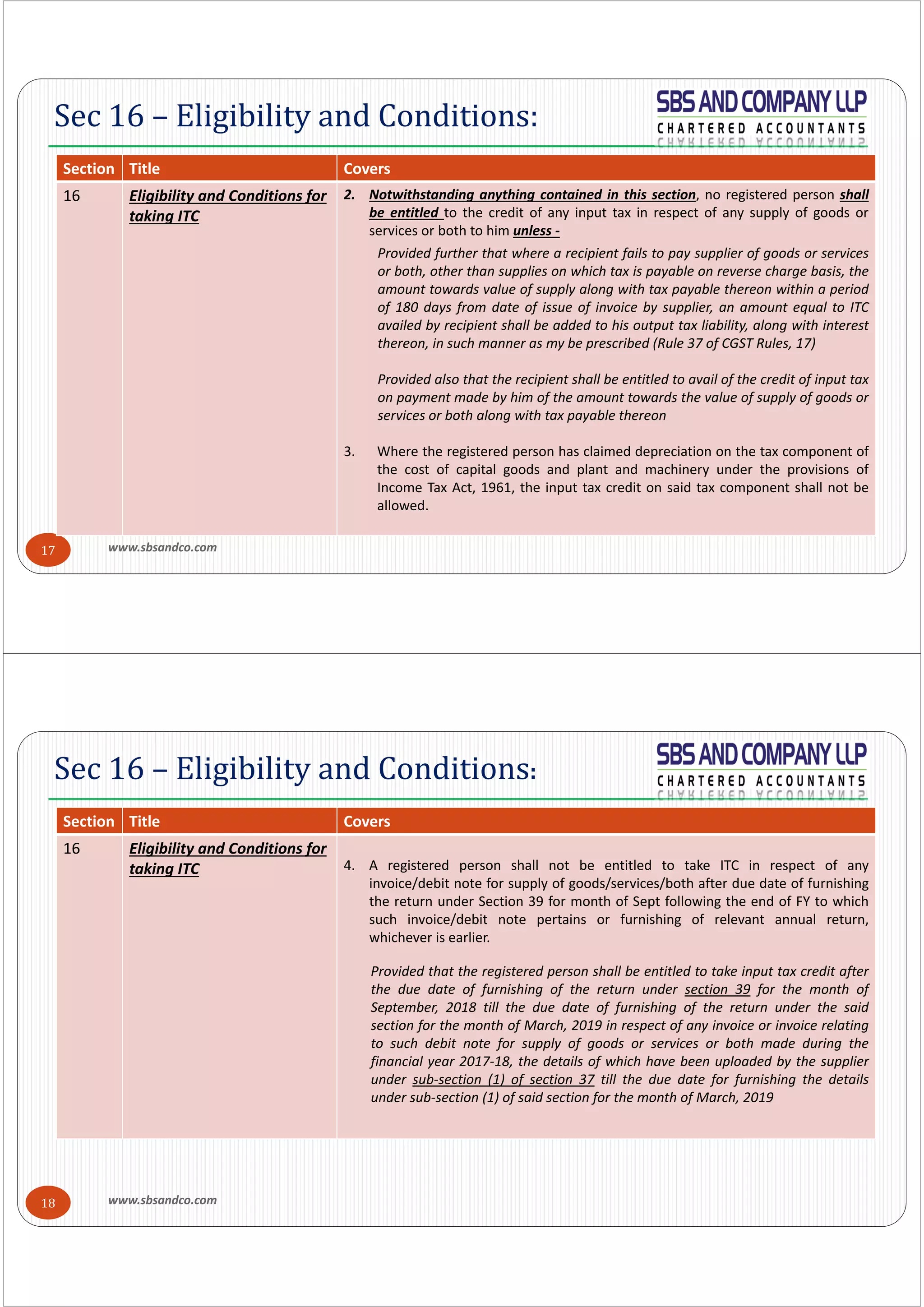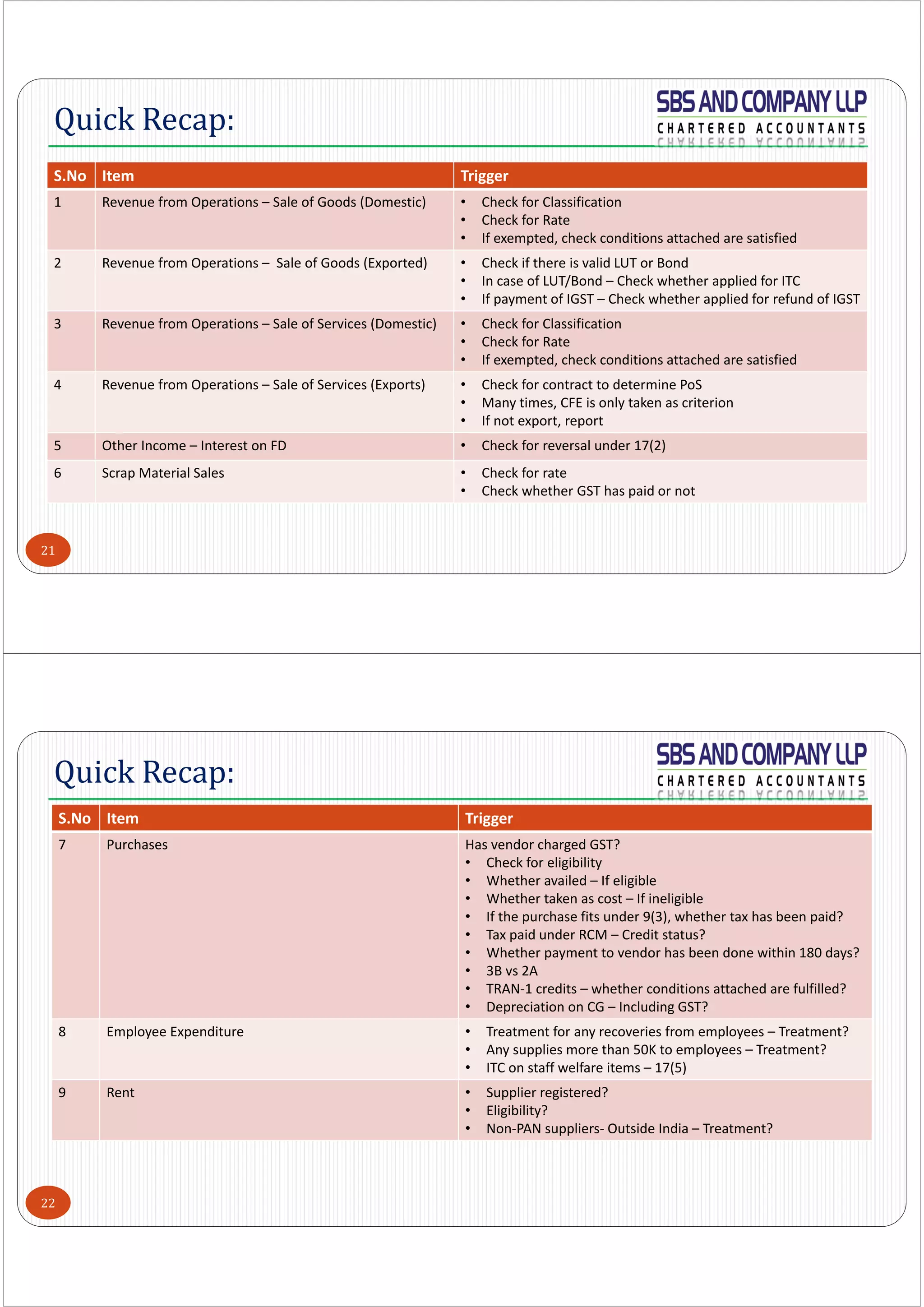The document outlines the agenda for a two-day training event on financial auditing hosted by Palmetto IT Solutions from March 12-13, 2019. The event will cover various topics through a series of presentations and speakers, including an inaugural speech, sessions on compliance requirements under taxation laws, audit documentation, and soft skills. It will take place at Palmetto IT Solutions' office in Hyderabad, India. The document provides the detailed schedule listing the session topics and speakers for each time slot on both days of the event.

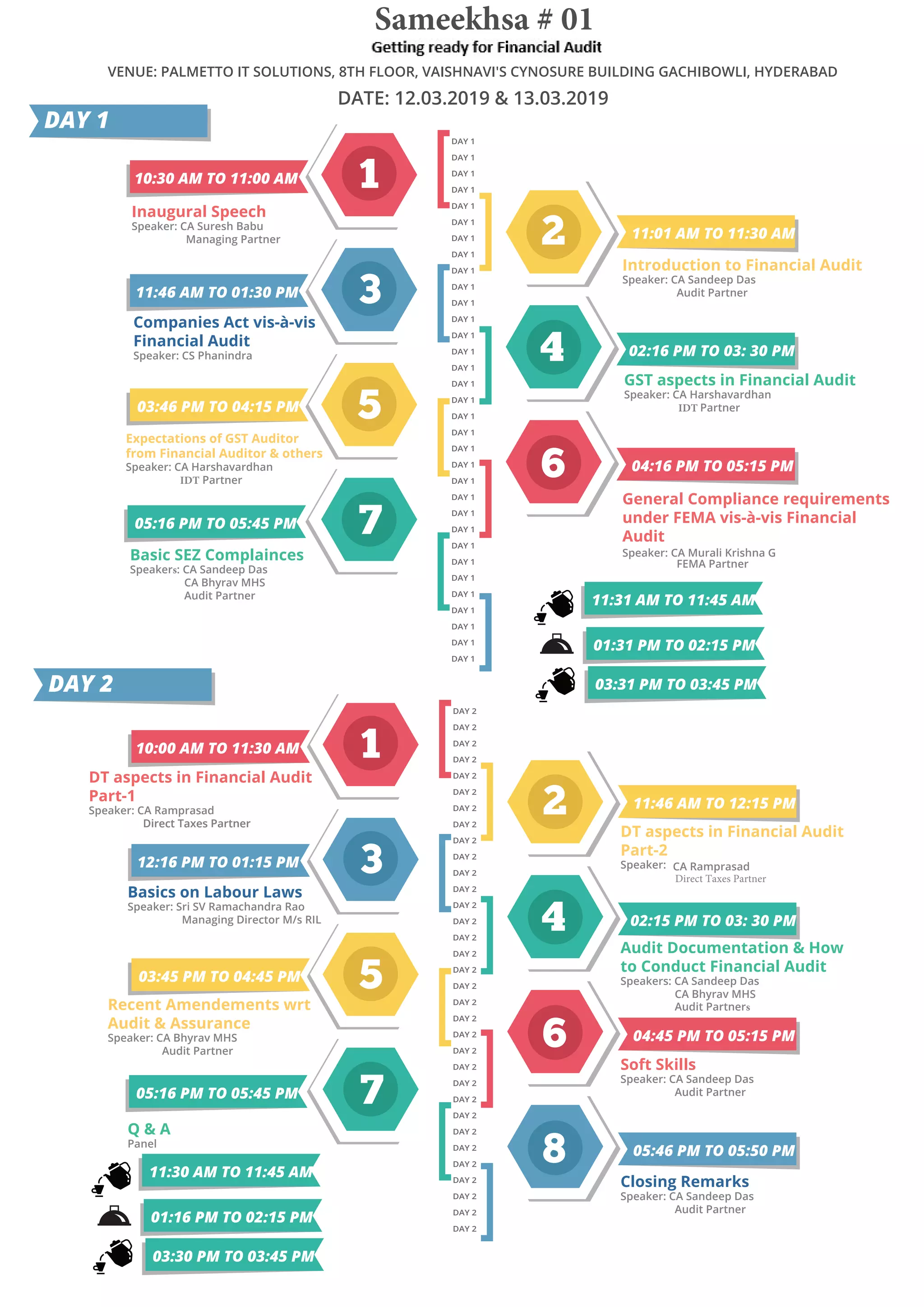

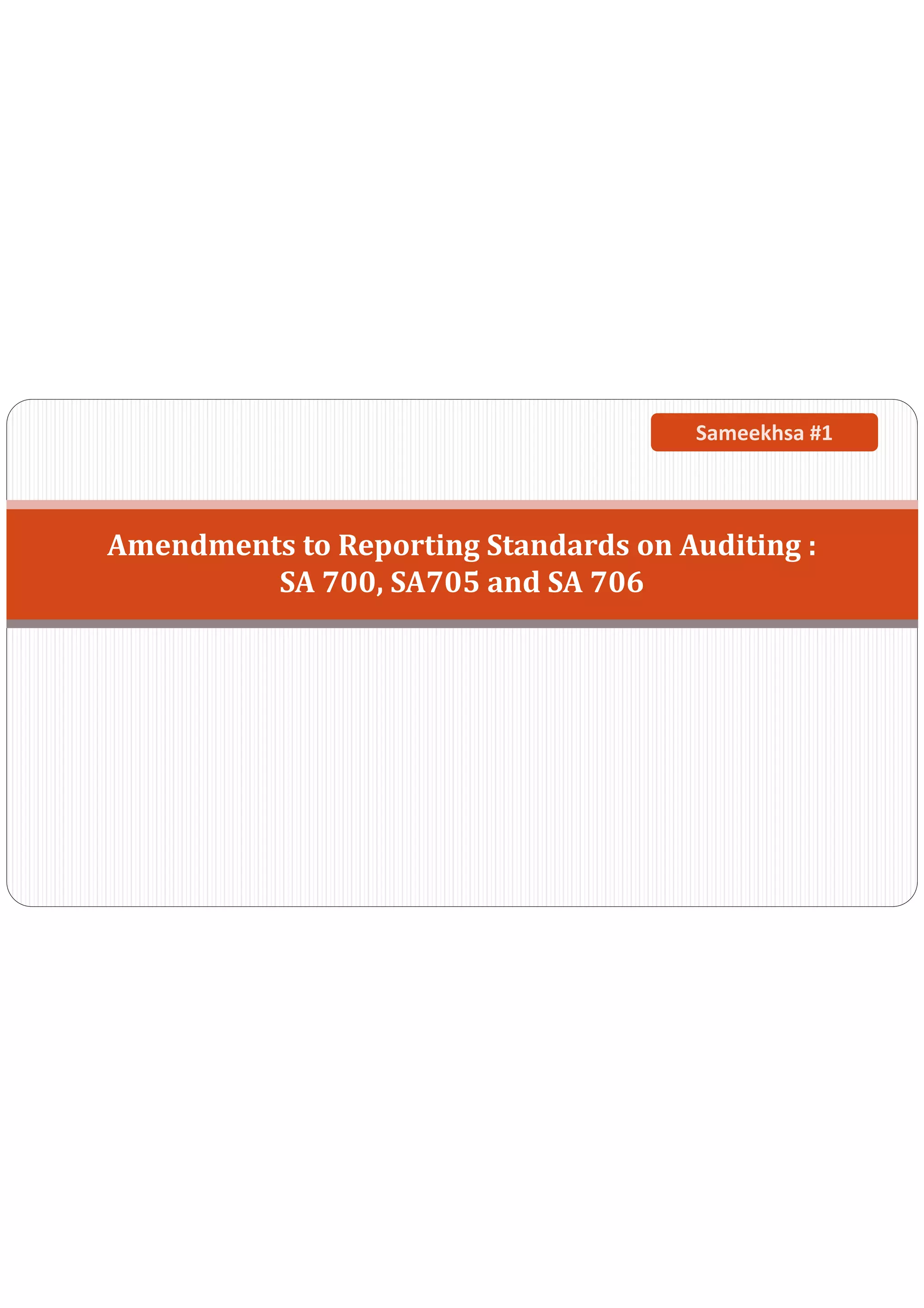
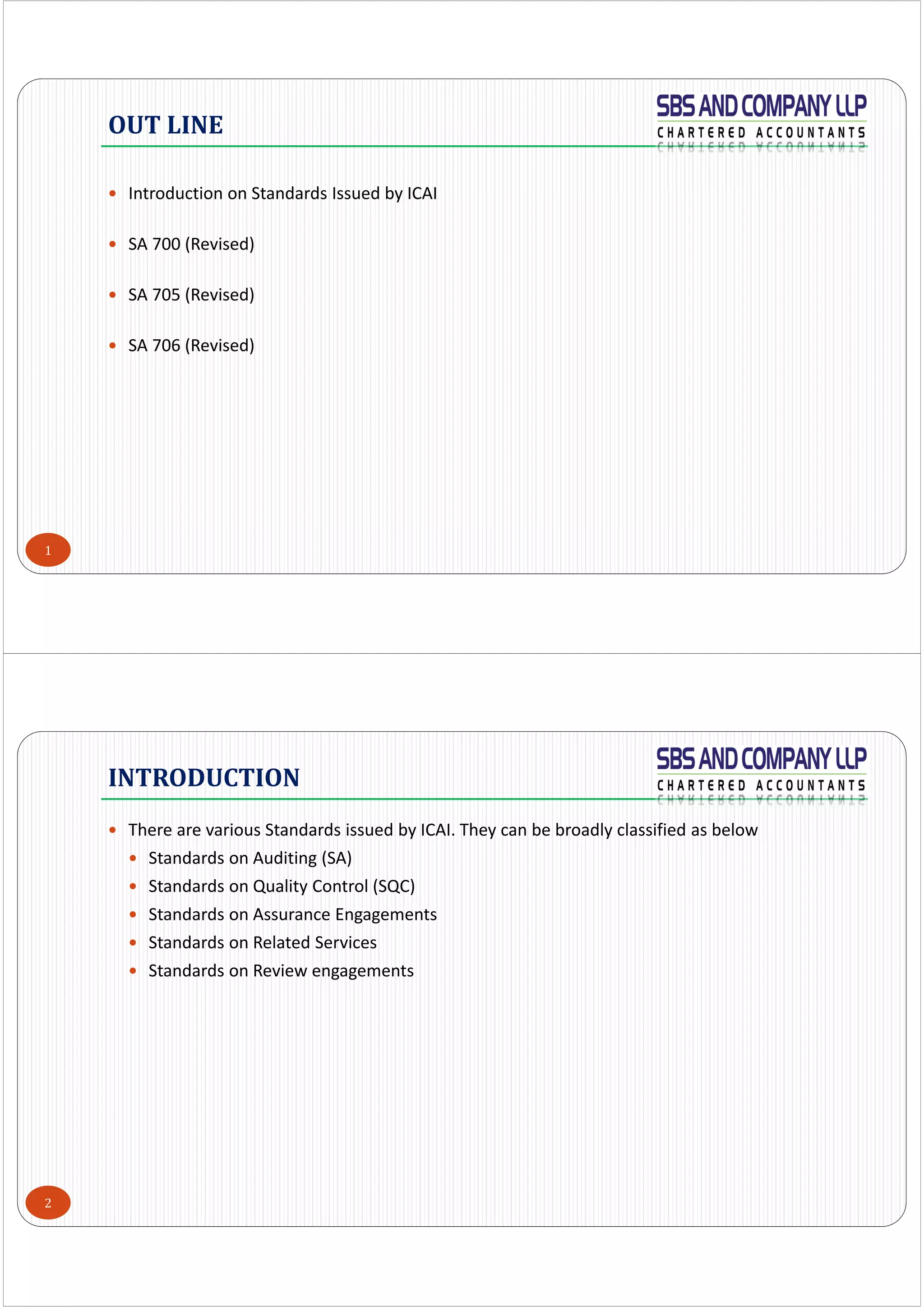
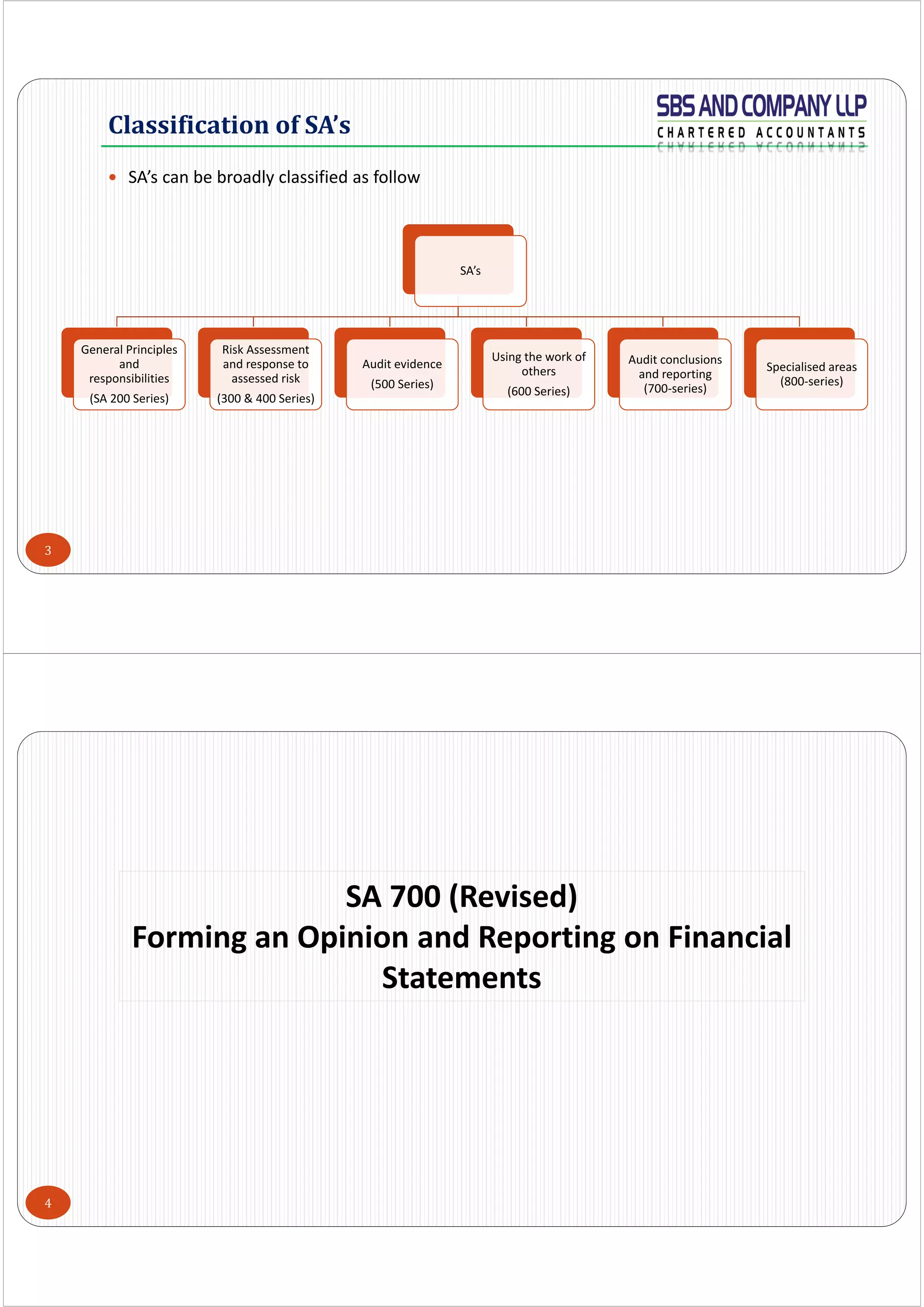
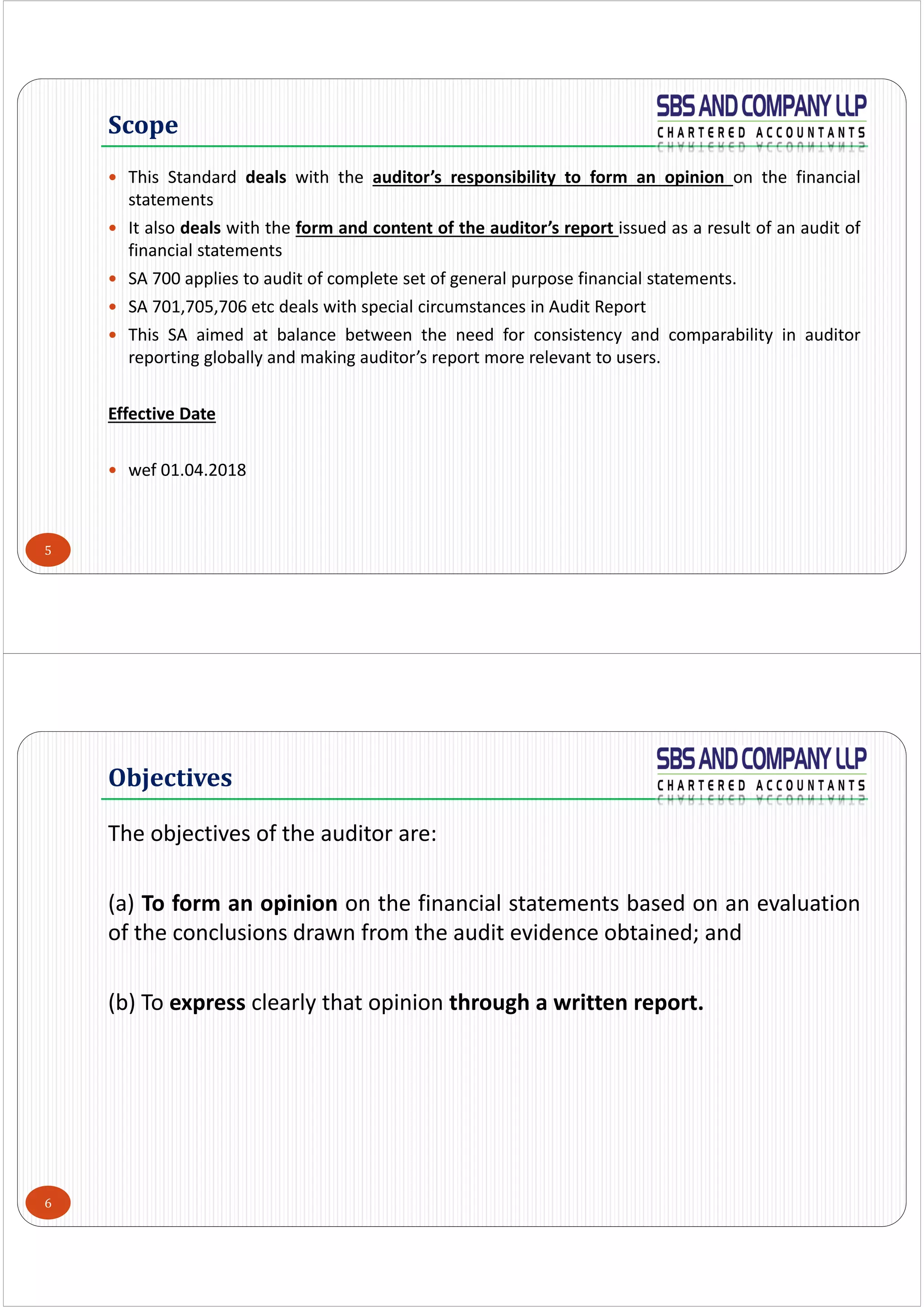

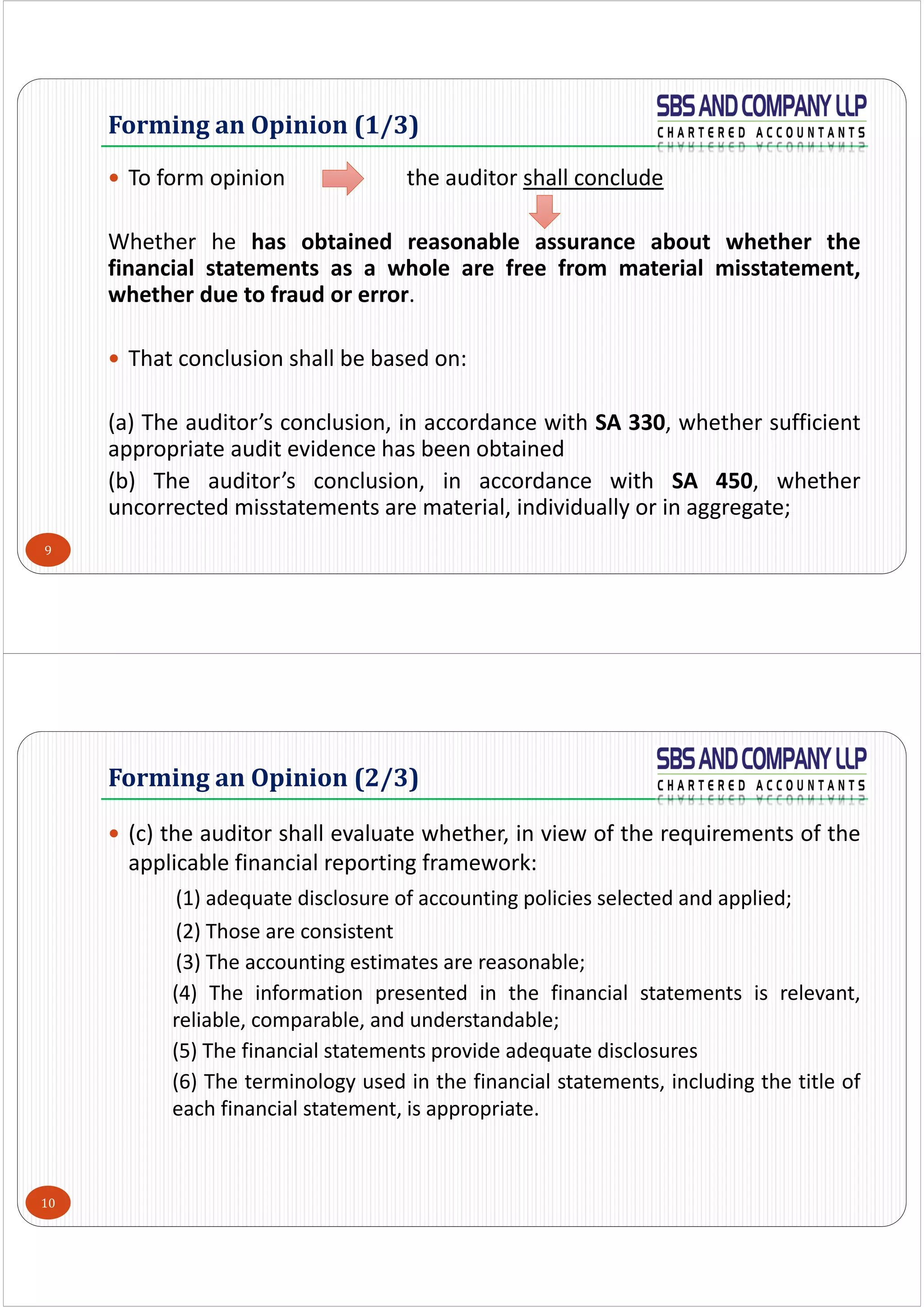





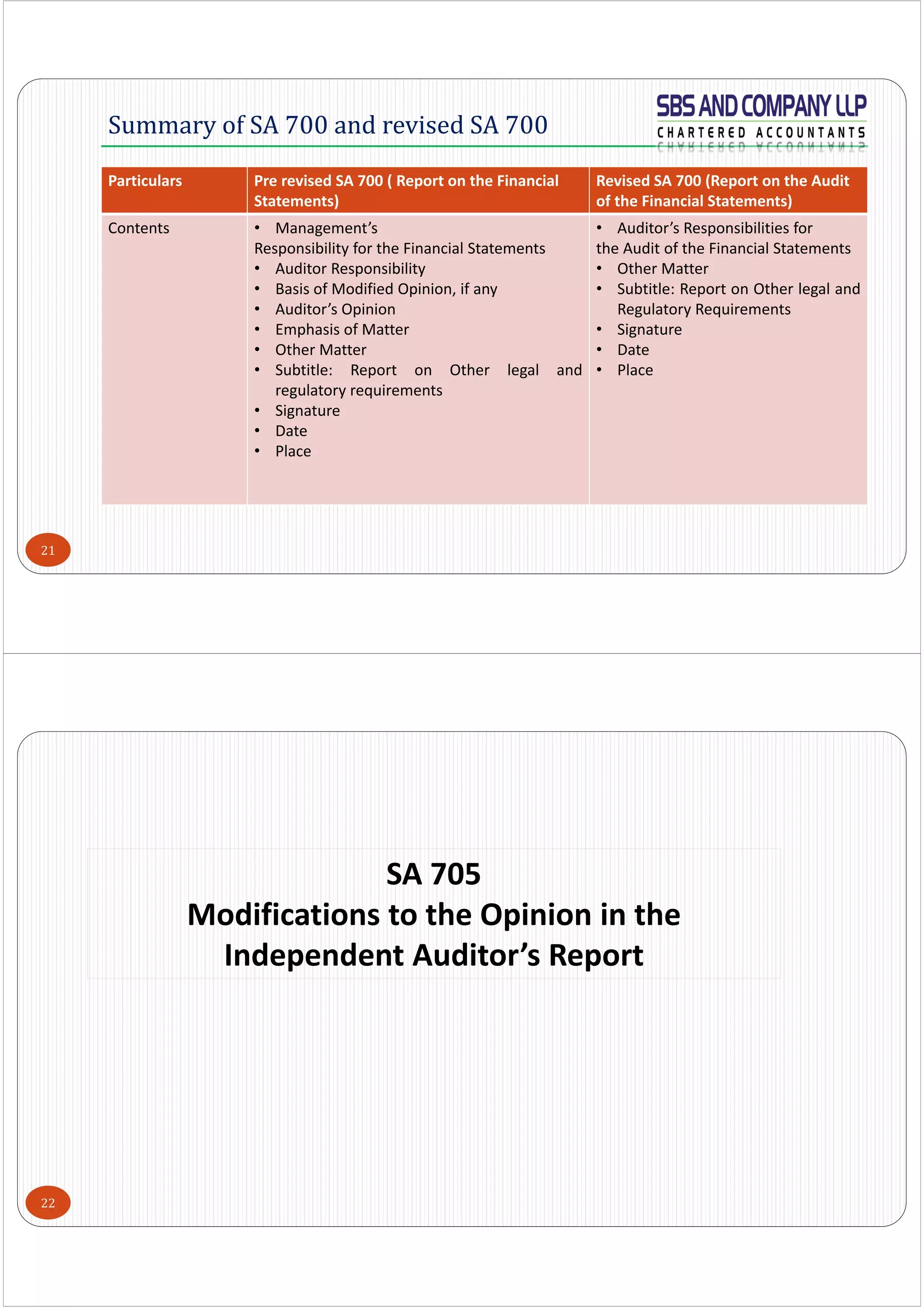







![1
SEZ
www.sbsandco.com +040‐4018 3366 2
As per SEZ Act,2005 ‐
“Special Economic Zone” means each Special Economic Zone notified under the proviso to sub‐
section(4) of section 3 and sub‐section(1) of section 4 and includes an existing Special Economic Zone (SEZ).
[Refer Section 2(za) of SEZ Act, 2005]
In general ‐
“It is a specifically delineated duty‐free enclave and shall deemed to be a foreign territory for the
purpose of trade operations, duties and tariffs”.
…EXIM Policy 2000, Chapter 9 para 30
What is SEZ ?](https://image.slidesharecdn.com/sameekshavolume01march-2019-190321012904/75/Sameeksha-volume-01-march-2019-23-2048.jpg)
![www.sbsandco.com +040‐4018 3366 3
As per SEZ Act, 2005 ‐
“Unit” means a Unit set up by an entrepreneur in a Special Economic Zone and includes an existing
Unit, an Offshore Banking Unit and a Unit in an International Financial Services Centre whether established
before or established after the commencement of this Act
[Refer Section 2(zc) of SEZ Act, 2005]
In general ‐
It is a specifically delineated area in the processing zone of SEZ setup by the entrepreneur (i.e., a
person who has been granted a LOA by DC for setting up of SEZ Unit)
What is SEZ Unit?
www.sbsandco.com +040‐4018 3366 4
As per SEZ Rules, 2006:
The Unit shall submit Annual Performance
Reports in the Form I, to the Development
Commissioner and the Development Commissioner
shall place the same before the Approval Committee
for consideration.
[Refer Rule 22(3) of SEZ Rules]
Annual Performance Report (APR): (1/4)](https://image.slidesharecdn.com/sameekshavolume01march-2019-190321012904/75/Sameeksha-volume-01-march-2019-24-2048.jpg)

![www.sbsandco.com +040‐4018 3366 7
Criteria For Annual Monitoring:
Units with negative NFE in the 1st and 2nd year shall be placed under the Watch List to watch their
performance
If a unit continues to have a negative NFE by the end of 3rd year, a Show Cause Notice will be issued.
If the negative performance continues till the end of 5th year, the Development Commissioner shall initiate
penal action under the provisions of Foreign Trade (Development and Regulation) Act, 1992 and the rules
made there under.
Annual Performance Report (APR): (4/4)
www.sbsandco.com +040‐4018 3366 8
As per SEZ Rules [Rule 22(2)] , 2006:
Every Unit and Developer shall maintain proper accounts, financial year wise, and such accounts which
should clearly indicate in value terms the goods imported or procured from Domestic Tariff Area,
consumption or utilization of goods, production of goods, including by‐products, waste or scrap or remnants,
disposal of goods manufactured or produced, by way of exports, sales or supplies in the domestic tariff area
or transfer to Special Economic Zone or Export Oriented Unit or Electronic Hardware Technology Park or
Software Technology Park Units or Bio‐technology Park Unit, as the case may be, and balance in stock.
The Unit and Developer has to maintain such records for a period of 7 years from the end of relevant
Financial Year.
The Unit engaged in both trading and manufacturing activities shall maintain separate records for trading
and manufacturing activities.
Maintenance of Proper Books of Accounts](https://image.slidesharecdn.com/sameekshavolume01march-2019-190321012904/75/Sameeksha-volume-01-march-2019-26-2048.jpg)
![www.sbsandco.com +040‐4018 3366 9
As per SEZ Rules[Rule 22(1)], 2006:
Grant of exemption, drawbacks and concession to the entrepreneur or Developer shall be obtained if Unit
executes a Bond‐cum‐Legal Undertaking in Form H, with regard to its obligations regarding proper
utilization and accountability of goods, including capital goods, spares, raw materials, components and
consumables including fuels, imported or procured duty free and regarding achievement of positive net
foreign exchange earning;
The BLUT shall be jointly accepted by the Development Commissioner (DC) and Specified Officer (SO);
The value of the BLUT shall be equal to the amount of effective duties leviable on import or procurement
from the DTA of the projected requirement of goods for three months or as required;
Bond‐cum‐legal undertaking (BLUT): (1/2)
www.sbsandco.com +040‐4018 3366 10
Where the value of BLUT executed falls short on account of requirement of additional goods, the Unit or the
Developer shall submit additional Bond‐cum‐Legal Undertaking;
The BLUT amount shall be monitored quarterly or yearly on the basis of Quarterly Progress Report or Annual
Progress Report submitted by the Developer or Unit;
The value of the BLUT in respect of gems and jewellery units shall be calculated on rates as notified by the
Central Government, from time to time;
Bond‐cum‐legal undertaking (BLUT): (2/2)](https://image.slidesharecdn.com/sameekshavolume01march-2019-190321012904/75/Sameeksha-volume-01-march-2019-27-2048.jpg)
![www.sbsandco.com +040‐4018 3366 11
As per SEZ Rules [Rule 36], 2006:
All documents for admission of goods into and out of Special Economic Zone shall be filed before the
Authorized Officer of Customs.
As per SEZ Rules [Rule 78], 2006:
Every developer and unit shall file applications and returns electronically on the Special Economic Zone
online system within a period of one month of the system being commissioned.
Details of every transaction done by a SEZ unit has to be reported in SEZ online portal periodically.
Filing of documents and Reporting
www.sbsandco.com +040‐4018 3366 12
As per SEZ Rules[Rule24], 2006:
An application for grant of Duty Entitlement Pass Book credit for supplies from DTA to a Unit or
Developer may be made by the DTA Supplier or the Unit or Developer in the format prescribed under the
Foreign Trade Policy.
A Unit or Developer shall file application for Duty Entitlement Pass Book claim with the Development
Commissioner concerned or the DTA supplier may claim the same from the concerned Licensing Authority of
the Office of the Directorate General of Foreign Trade or the Development Commissioner concerned.
Duty Entitlement Pass Book Credit (DEPB):](https://image.slidesharecdn.com/sameekshavolume01march-2019-190321012904/75/Sameeksha-volume-01-march-2019-28-2048.jpg)

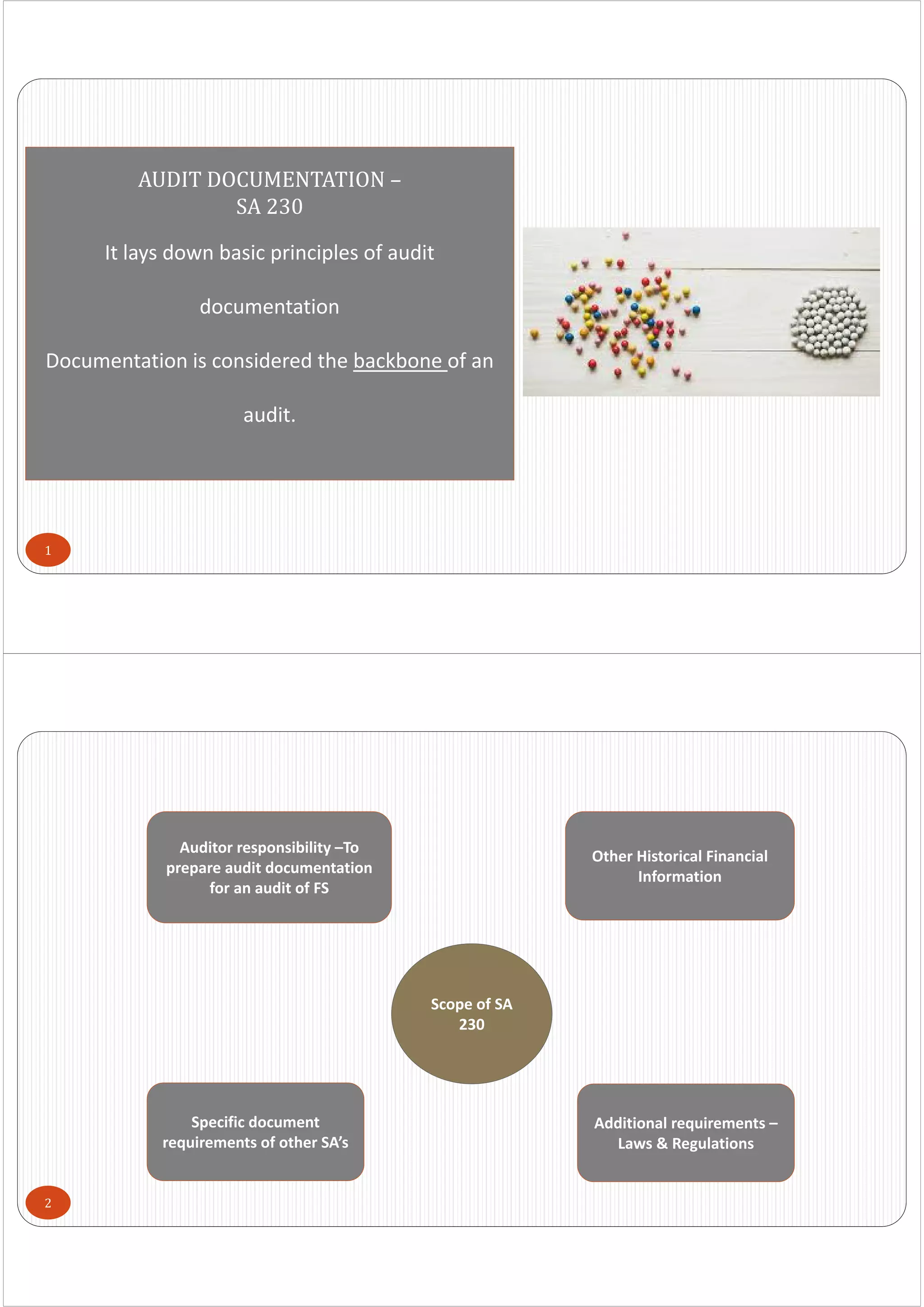

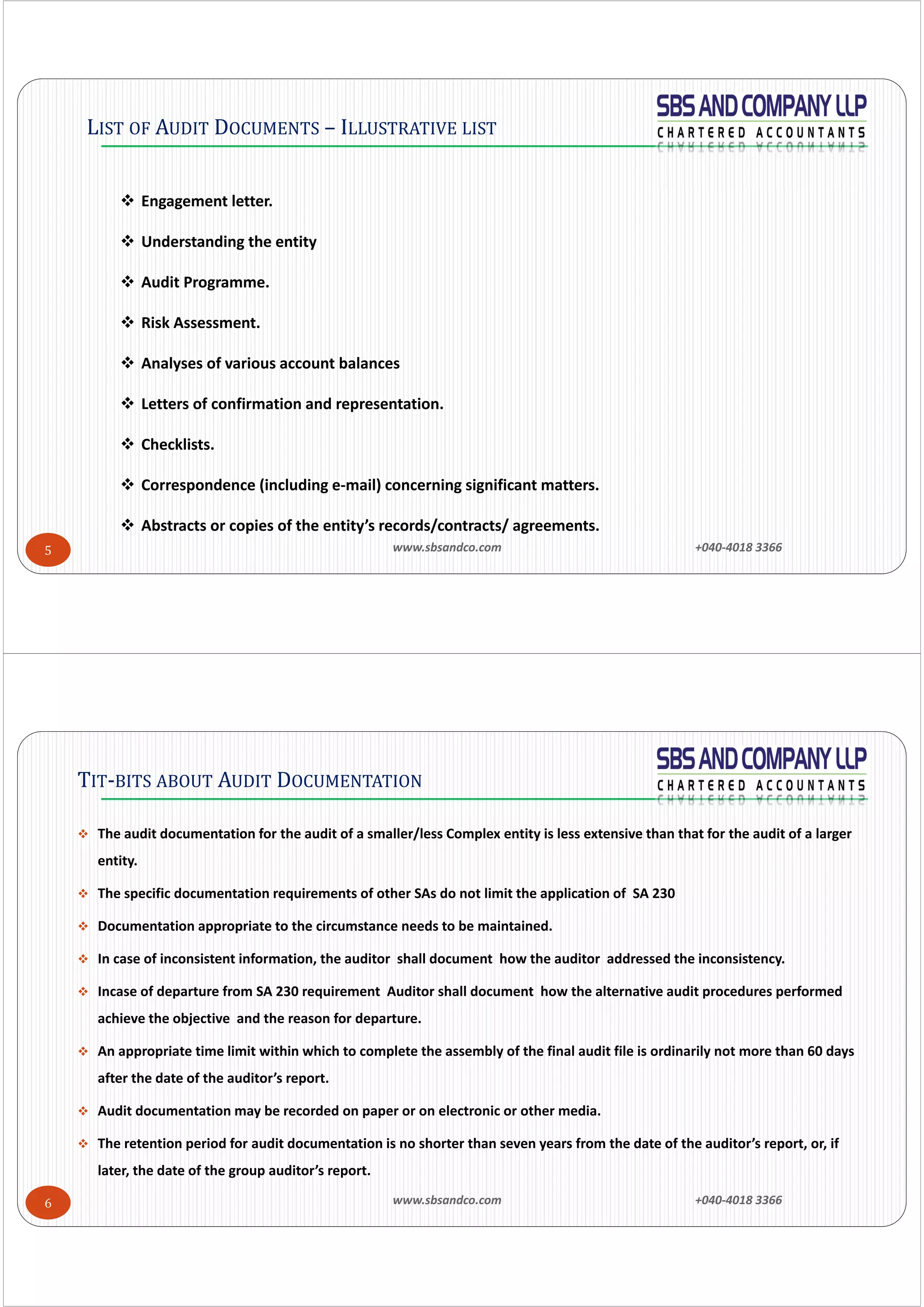
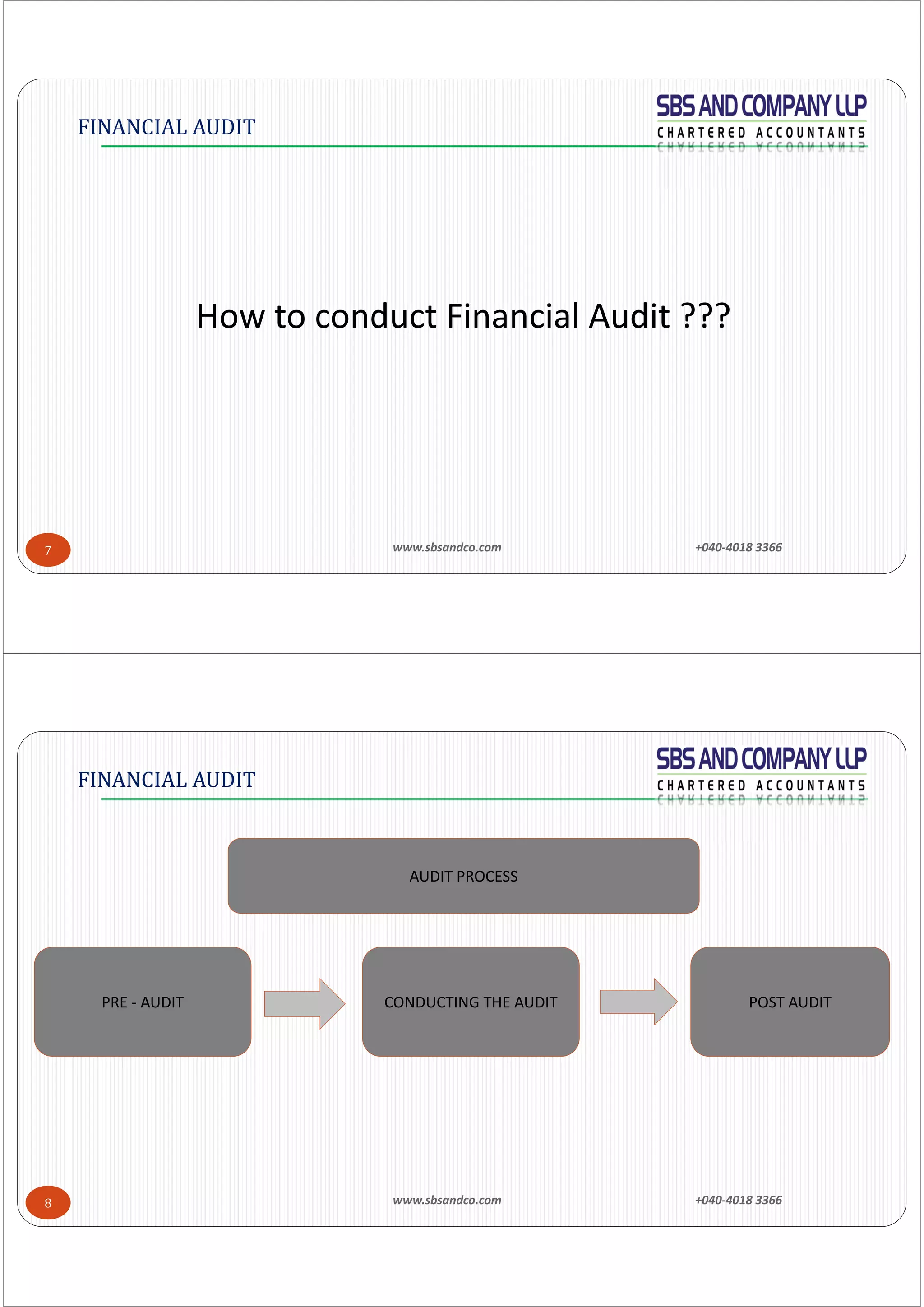



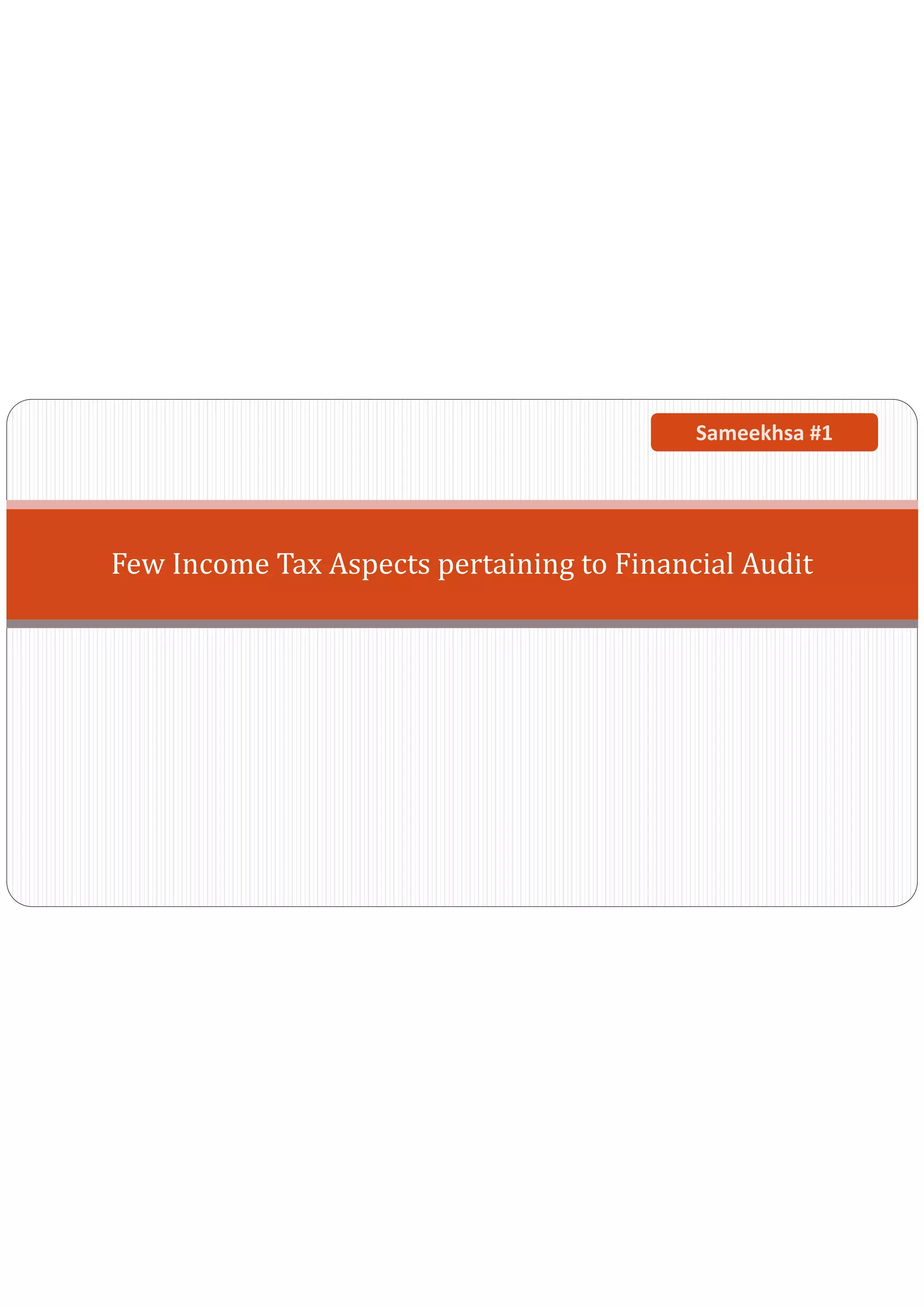


![5
Cash Transactions-1/4
6
Section Transactions in cash Consequences
40A(3) Payment or aggregate of payments in respect of
expenditure made to a person otherwise than using
banking channels of >Rs. 10k. Payment for transportation
of goods the limit is Rs. 35k
100% Exp be disallowed [Please
refer Rule 6DD for exceptions]
43 Payment or aggregate of payments for acquisition or part
there of any asset of > Rs. 10k
Expenditure shall be ignored for
the purpose of actual cost
80D Payment of Medical Health Insurance Premium / Medial
Expenditure (Excluding Preventive Health Check up of Rs.
5k)
Amount be paid out of income
chargeable to tax.
80G/GGA/
GGB/GGC
Payment of Donations > Rs. 2k No deduction shall be allowed
80JJAA Payment of Additional Employee Cost‐ Existing No deduction be allowed
269SS Take or Accept loan or deposit/specified sum of Rs. 20k Penalty @100% of the amount of
loan or deposit/specified sum‐ JC
269T Repayment of loan or deposit/specified sum of Rs. 20k Penalty @100% of the amount of
loan or deposit/specified sum‐ JC
Cash Transactions-2/4](https://image.slidesharecdn.com/sameekshavolume01march-2019-190321012904/75/Sameeksha-volume-01-march-2019-40-2048.jpg)
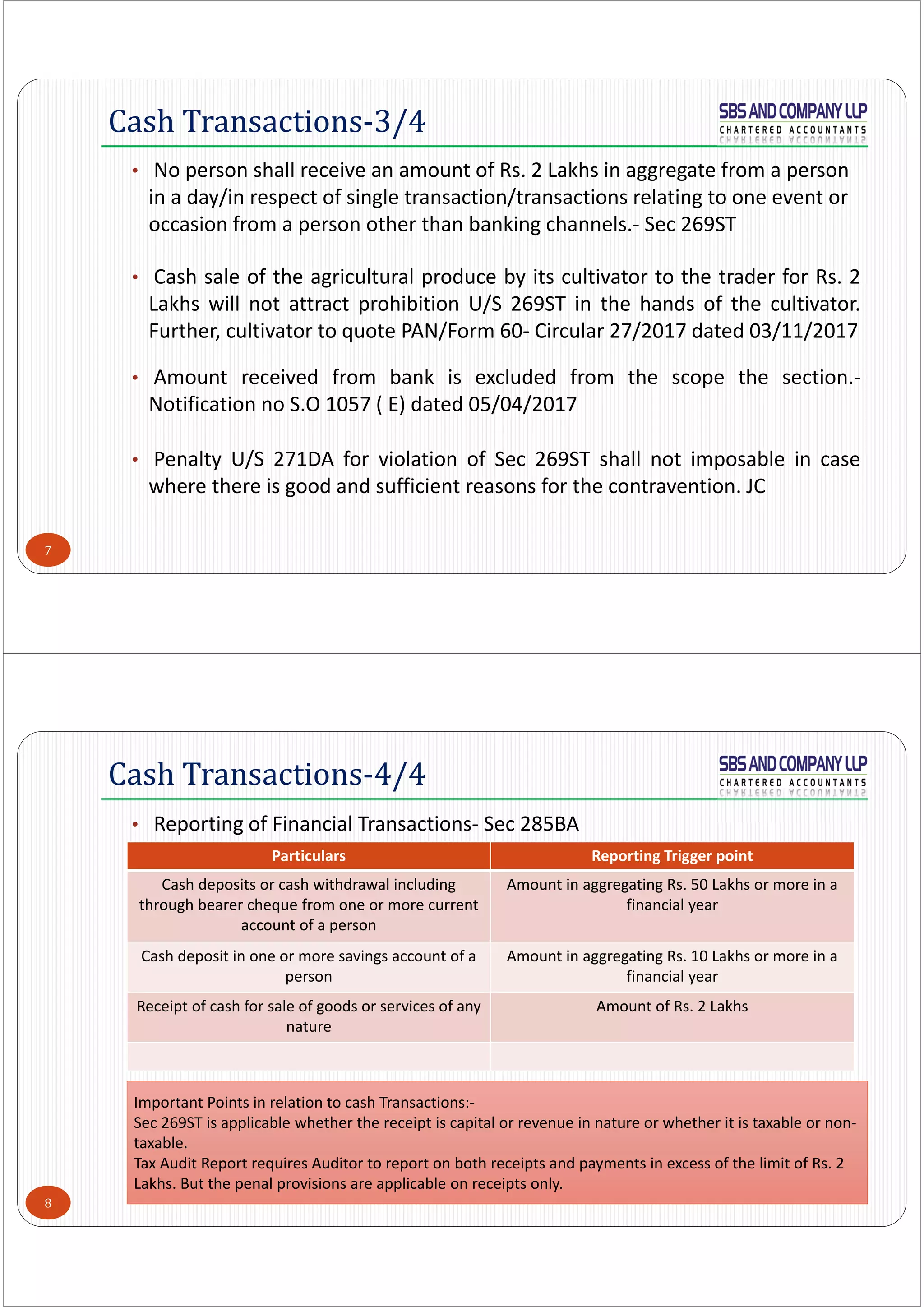
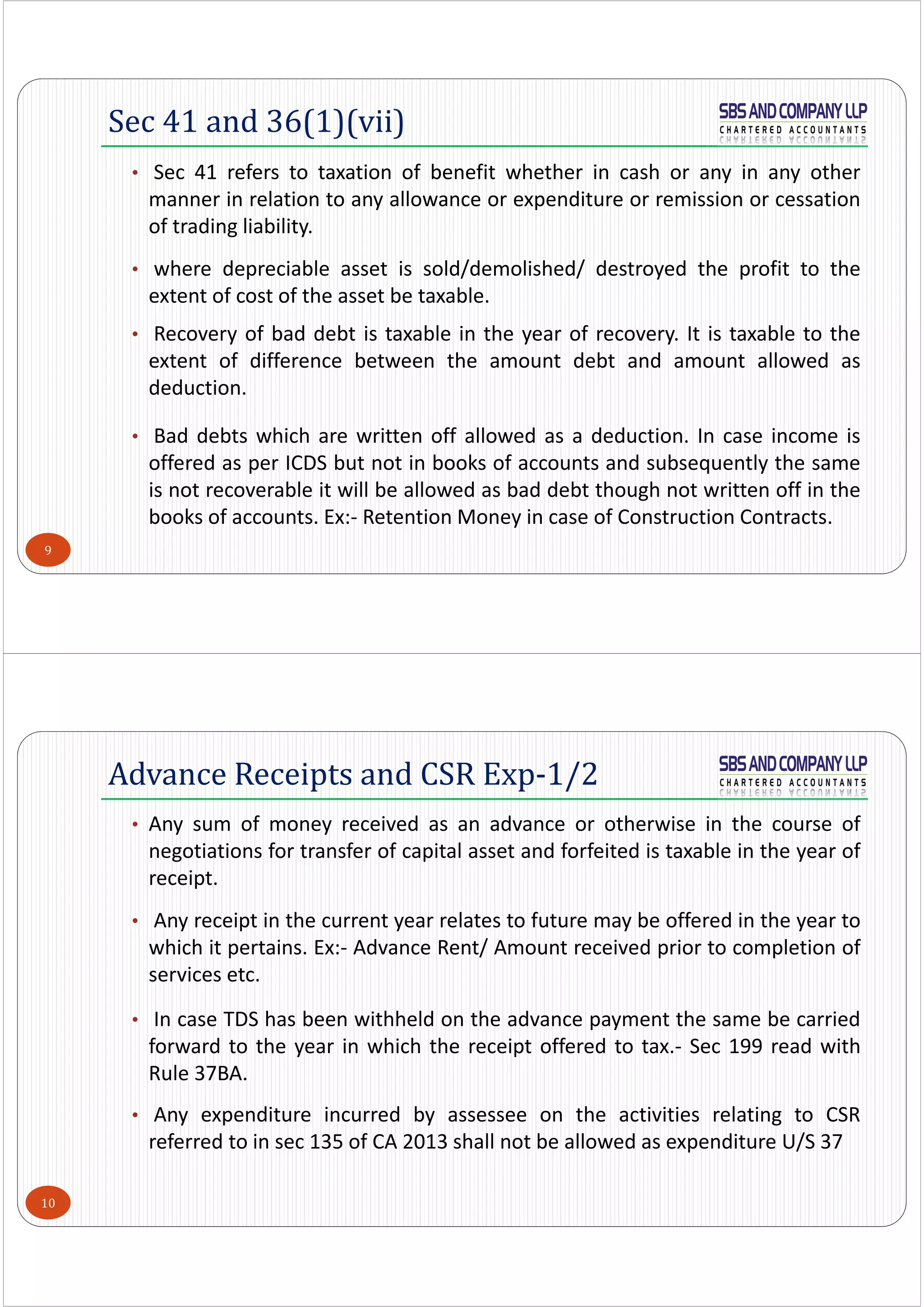

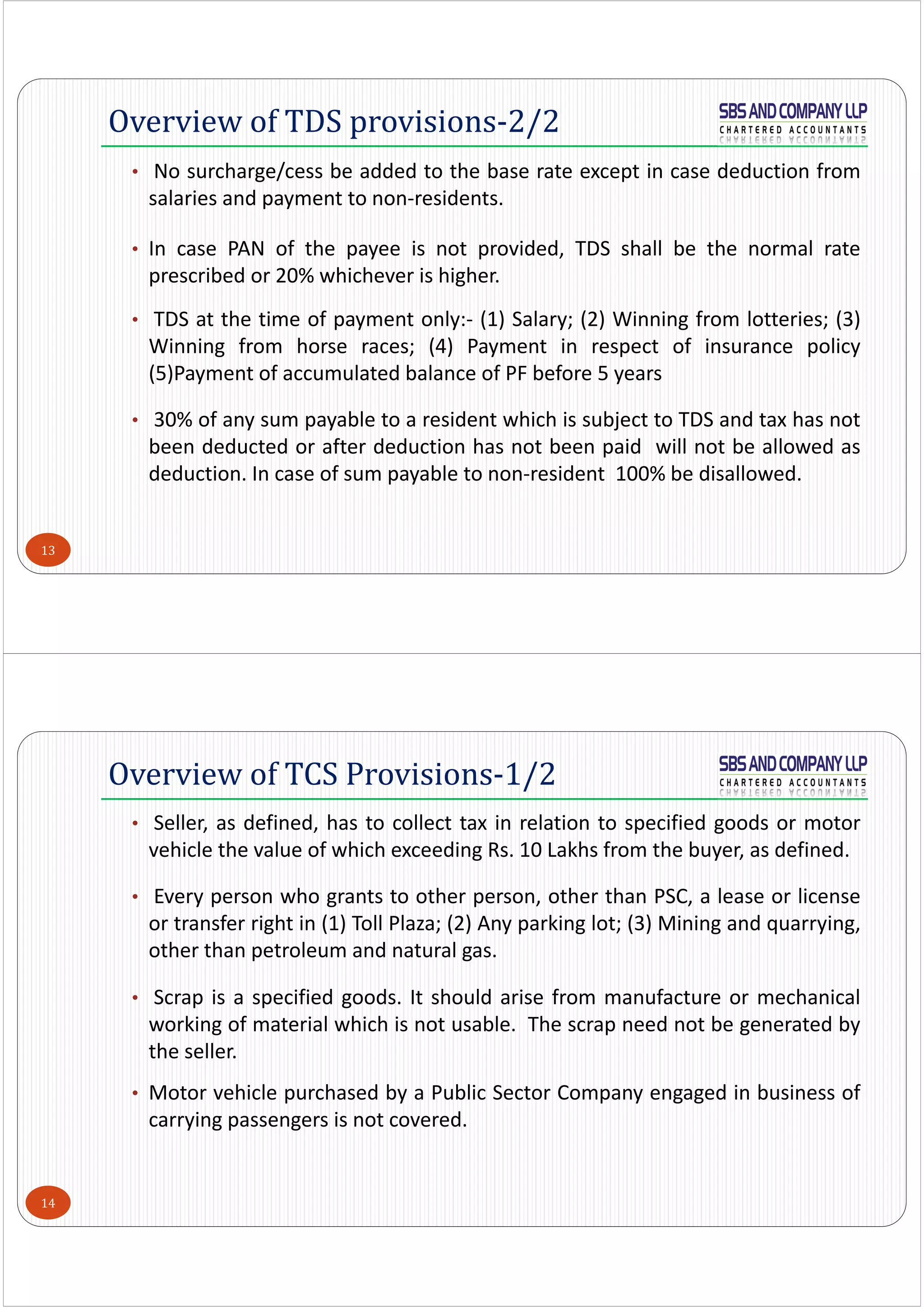



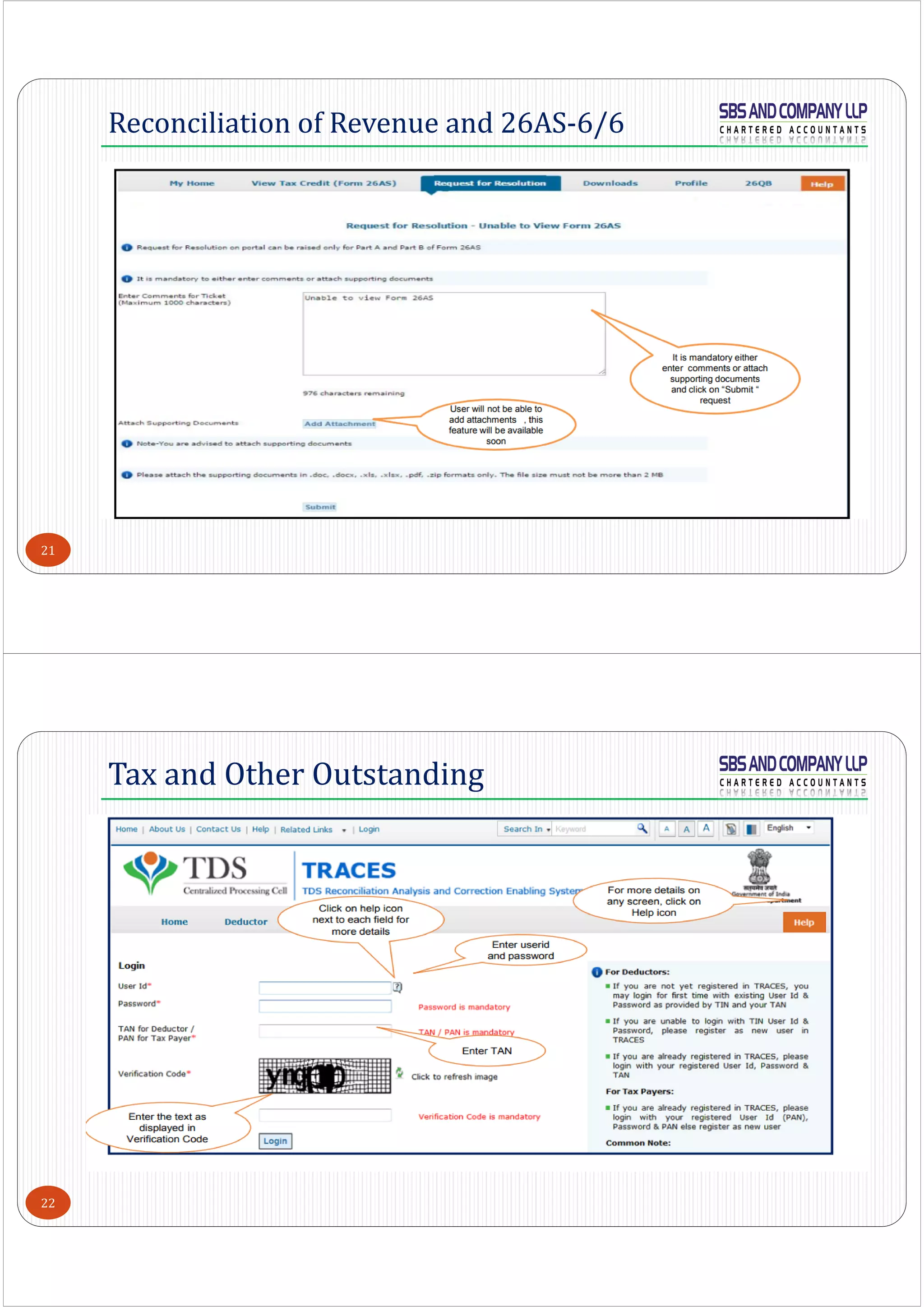


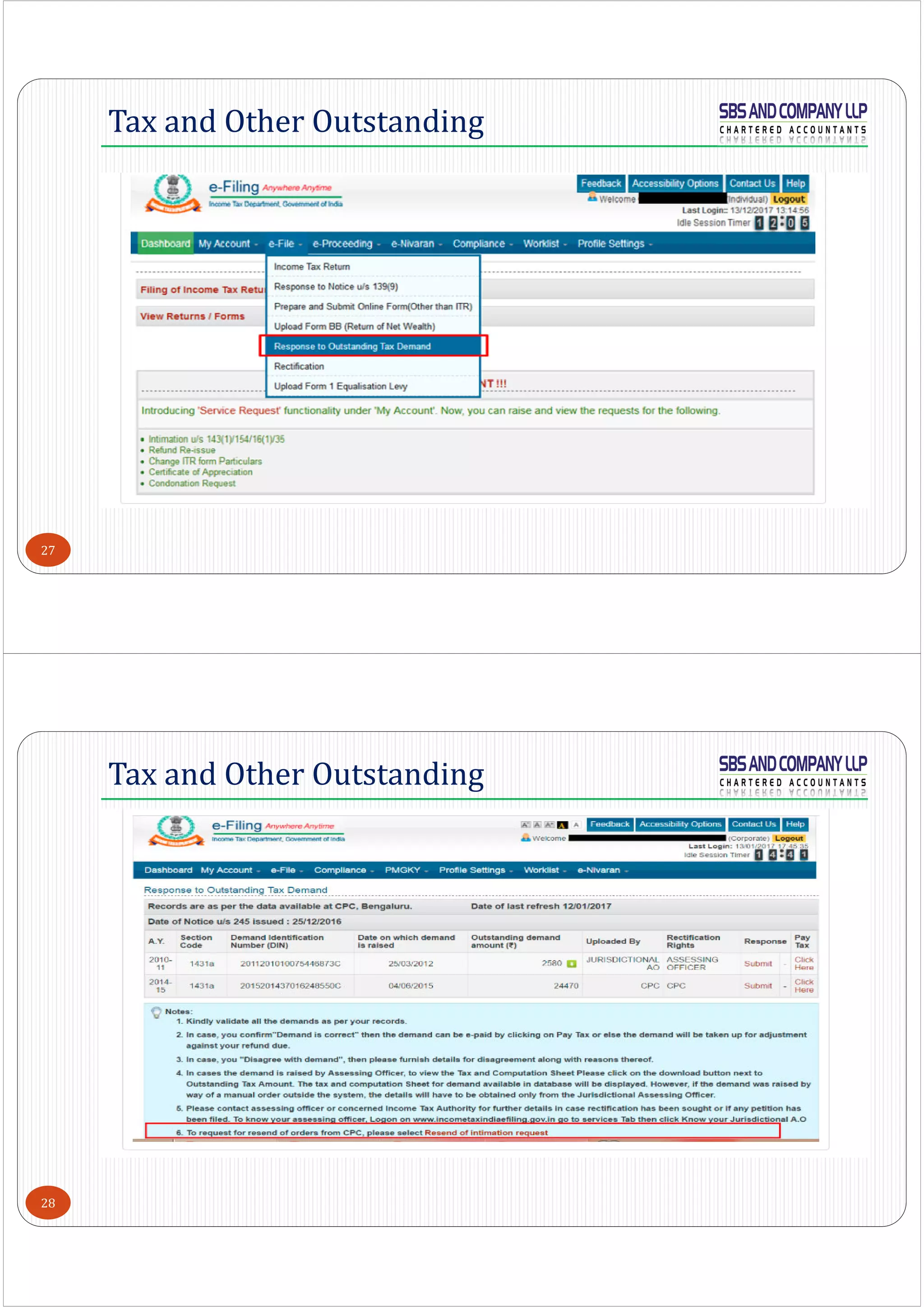


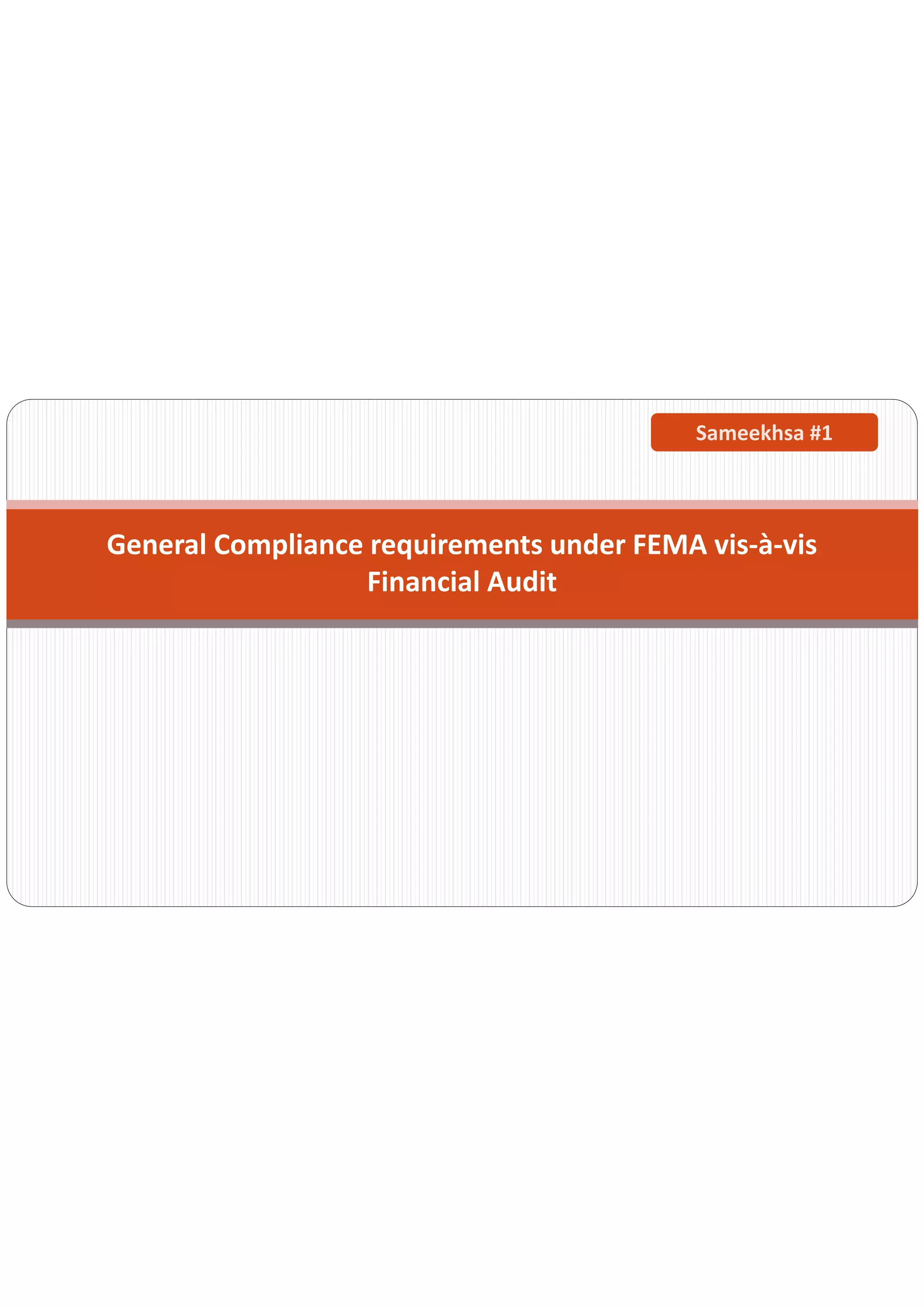
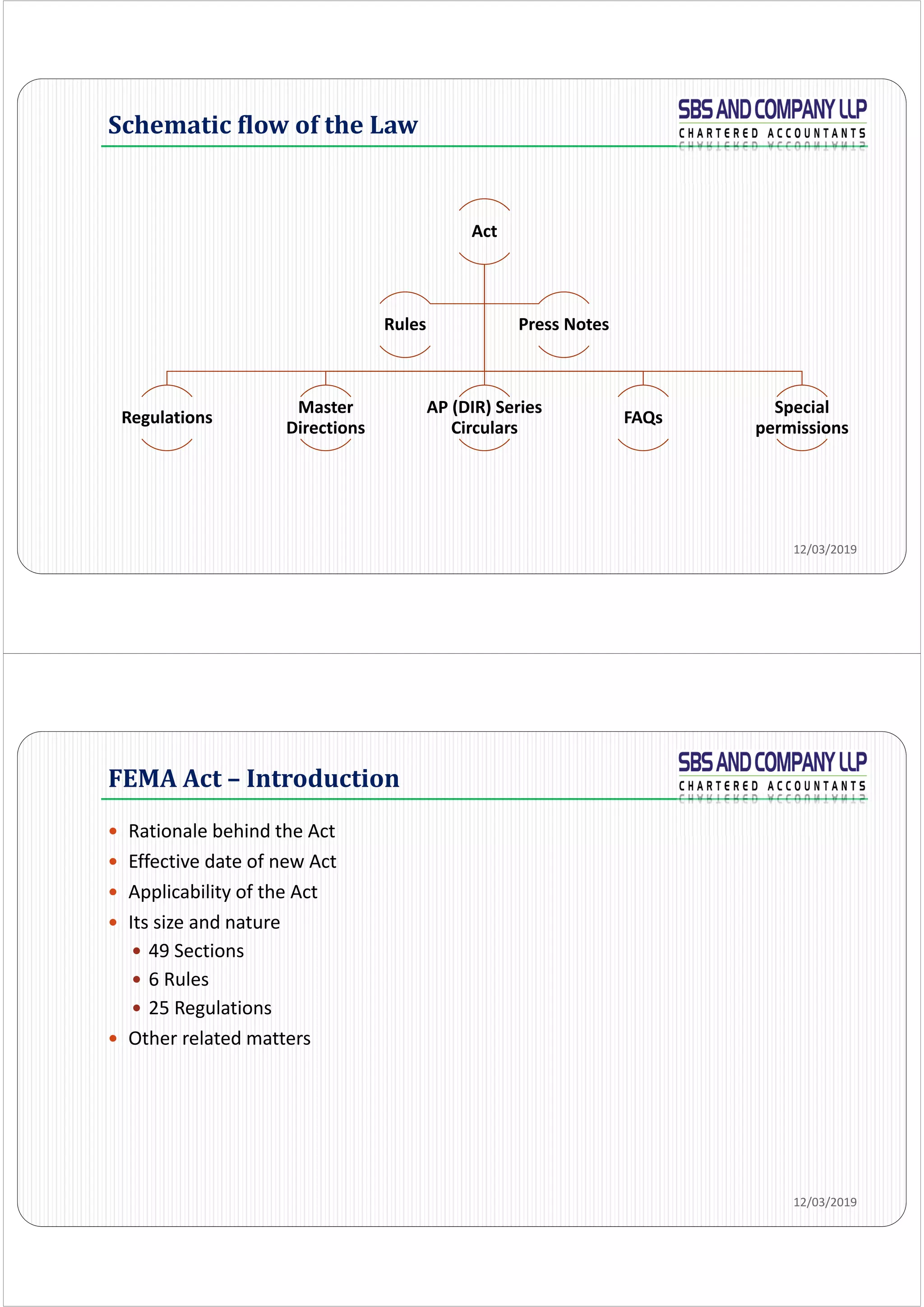
![Key Definitions (1/4)
Authorized Person [2(c)]
Capital Account Transaction [2(e)]
a transaction which alters
the assets or liabilities, including contingent liabilities, outside India of persons resident in
India
or assets or liabilities in India of persons resident outside India,
includes transactions referred to in sub‐section (3) of section 6
Currency [2(h)]
includes
all currency notes, postal notes, postal orders, money orders,
cheques, drafts, travellers cheques,
letters of credit, bills of exchange and promissory notes,
credit cards or such other similar instruments, as may be notified by the Reserve Bank
12/03/2019
Key Definitions (2/4)
Current Account Transaction [2(j)]
transaction other than a capital account transaction, and includes
payments due in connection with
foreign trade,
other current business,
services, and
short‐term banking and credit facilities in the ordinary course of business
payments due as interest on loans and as net income from investments,
remittances for living expenses of parents, spouse and children residing abroad, and
expenses in connection with foreign travel, education and medical care of parents,
spouse and children
12/03/2019](https://image.slidesharecdn.com/sameekshavolume01march-2019-190321012904/75/Sameeksha-volume-01-march-2019-56-2048.jpg)
![Key Definitions (3/4)
Foreign Currency [2(m)]
Foreign Exchange [2(n)]
Means foreign currency and includes
deposits, credits and balances payable in any foreign currency
drafts, travelers cheques, letters of credit or bills of exchange, expressed or drawn in Indian currency
but payable in any foreign currency
drafts, travelers cheques, letters of credit or bills of exchange drawn by banks, institutions or persons
outside India, but payable in Indian currency
Foreign Security [2(o)]
Means any security
in the form of shares, stocks, bonds, debentures or
any other instrument denominated or expressed in foreign currency and
includes securities expressed in foreign currency, but where redemption or any form of return such
as interest or dividends is payable in Indian currency
12/03/2019
Key Definitions (4/4)
Person[2(u)] – includes
individual,
HUF,
company,
firm,
AOP or a BOI, whether incorporated or not,
every artificial juridical person, and
any agency, office or branch owned or controlled by such person;
12/03/2019](https://image.slidesharecdn.com/sameekshavolume01march-2019-190321012904/75/Sameeksha-volume-01-march-2019-57-2048.jpg)
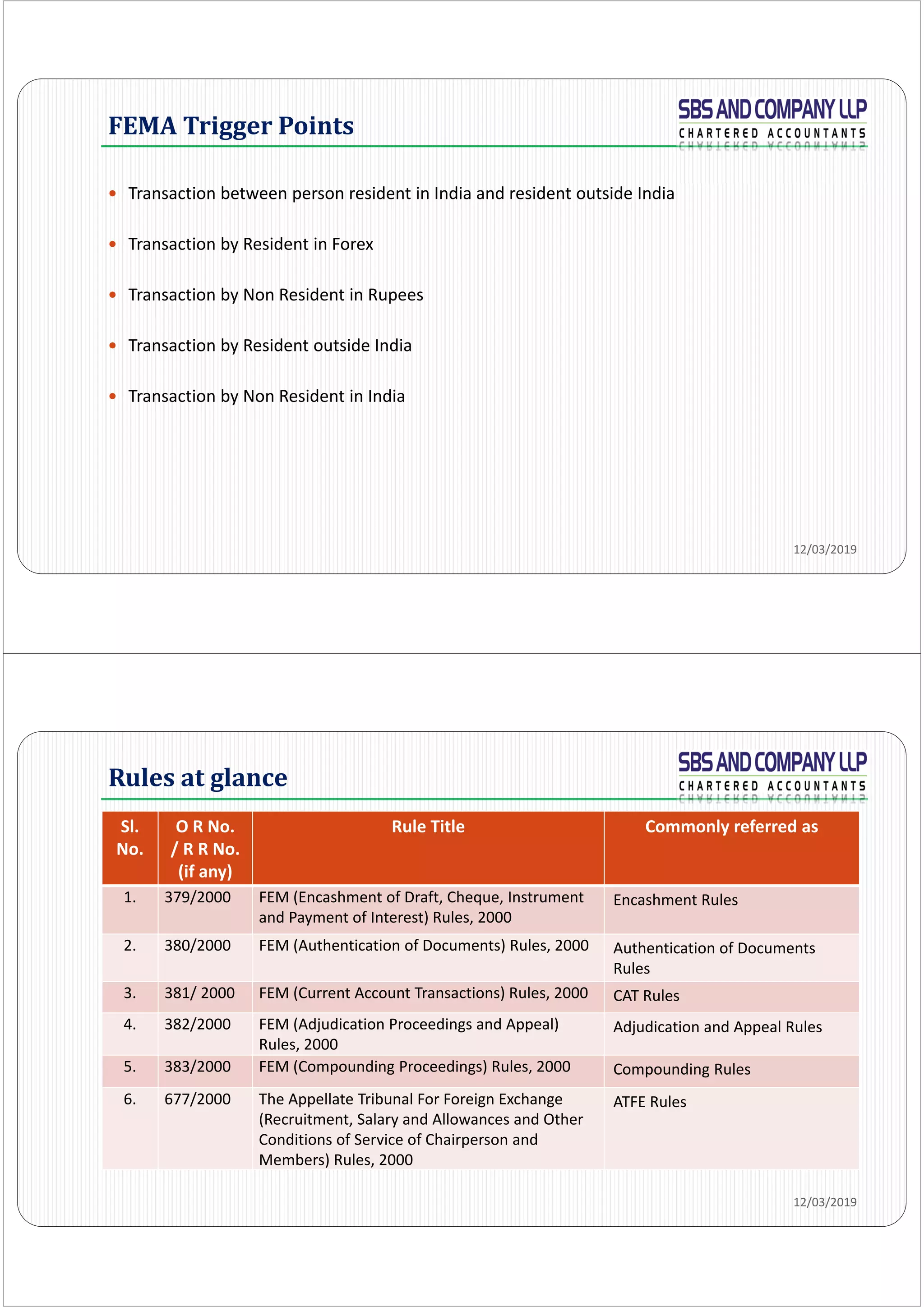


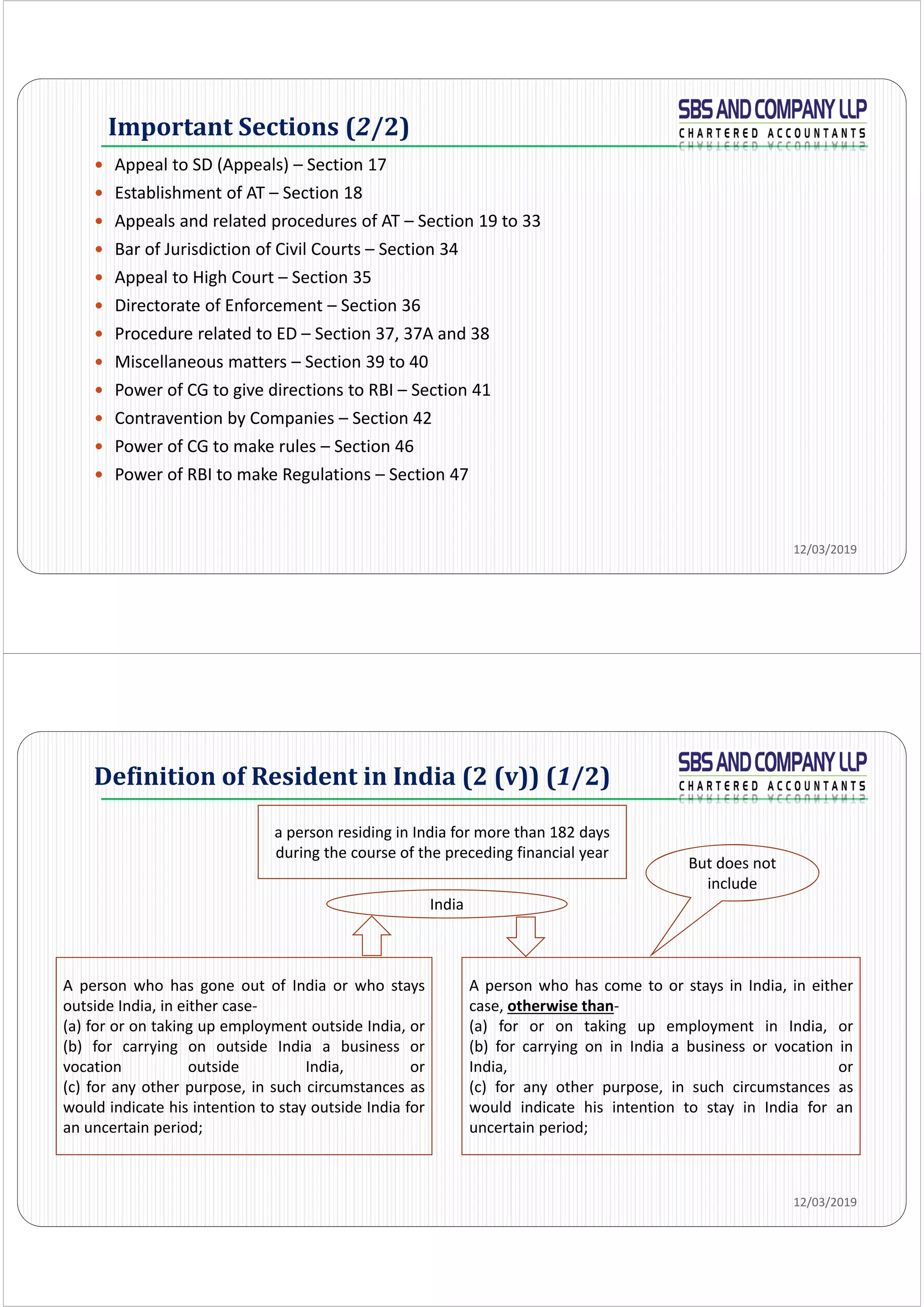
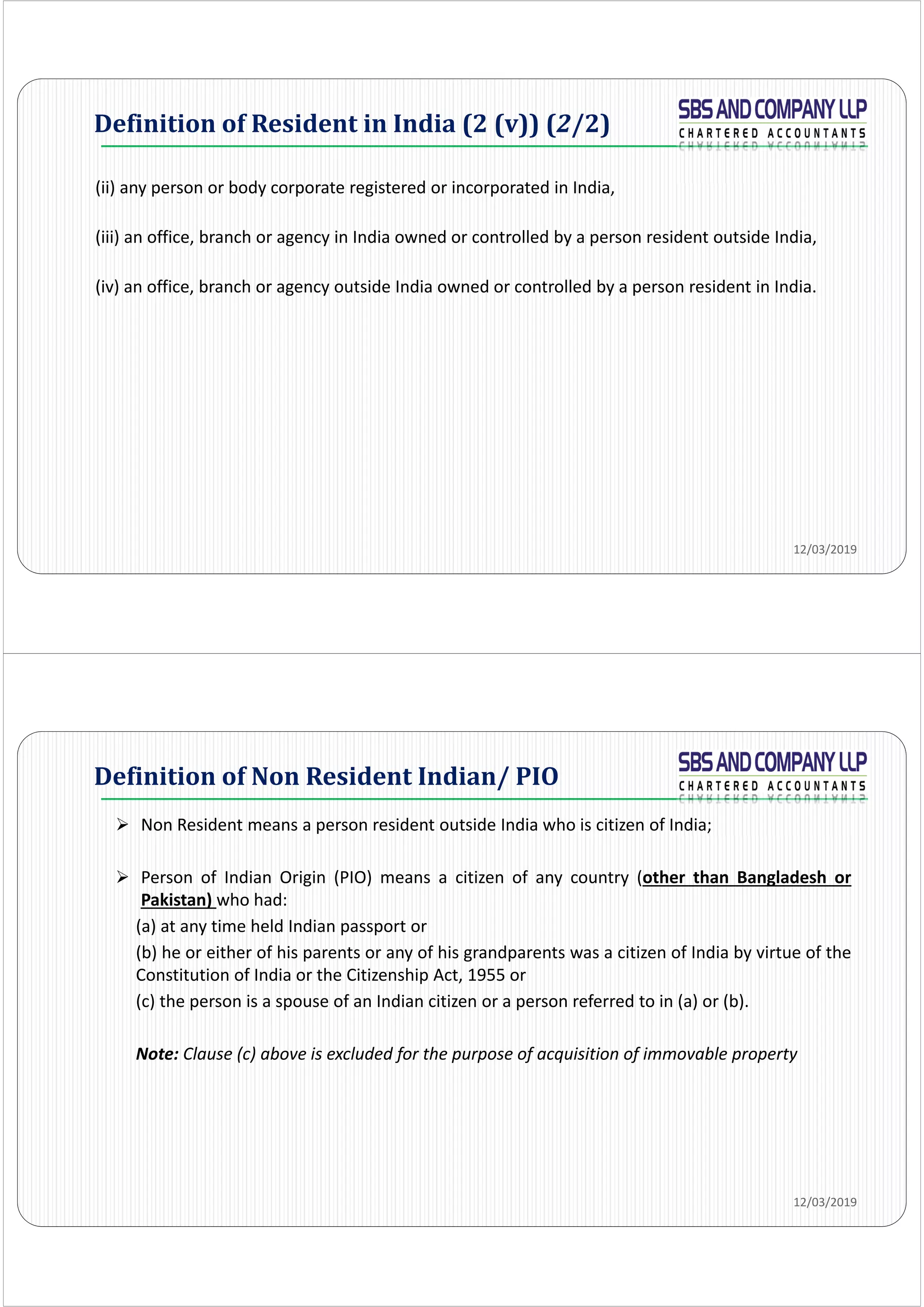

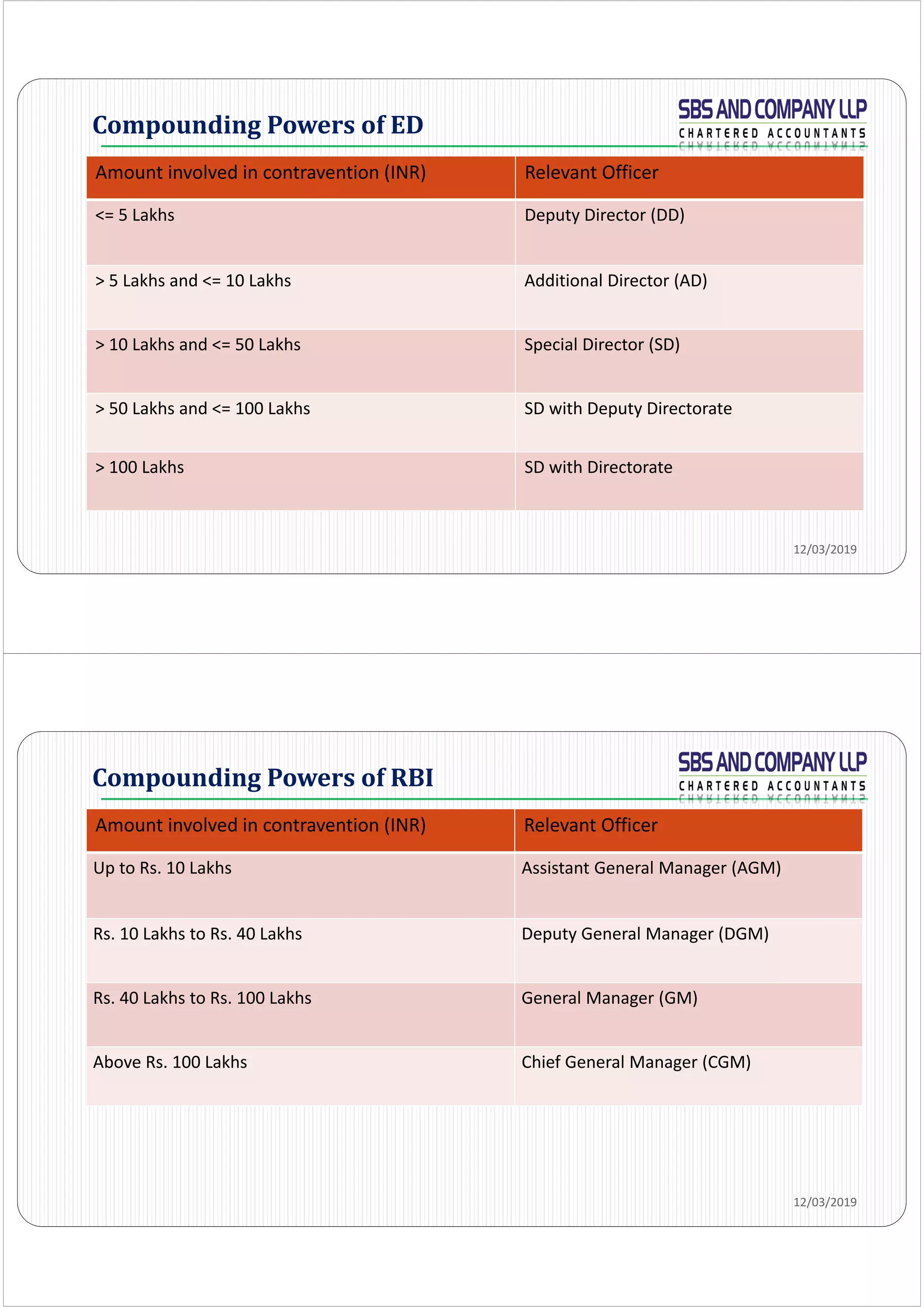
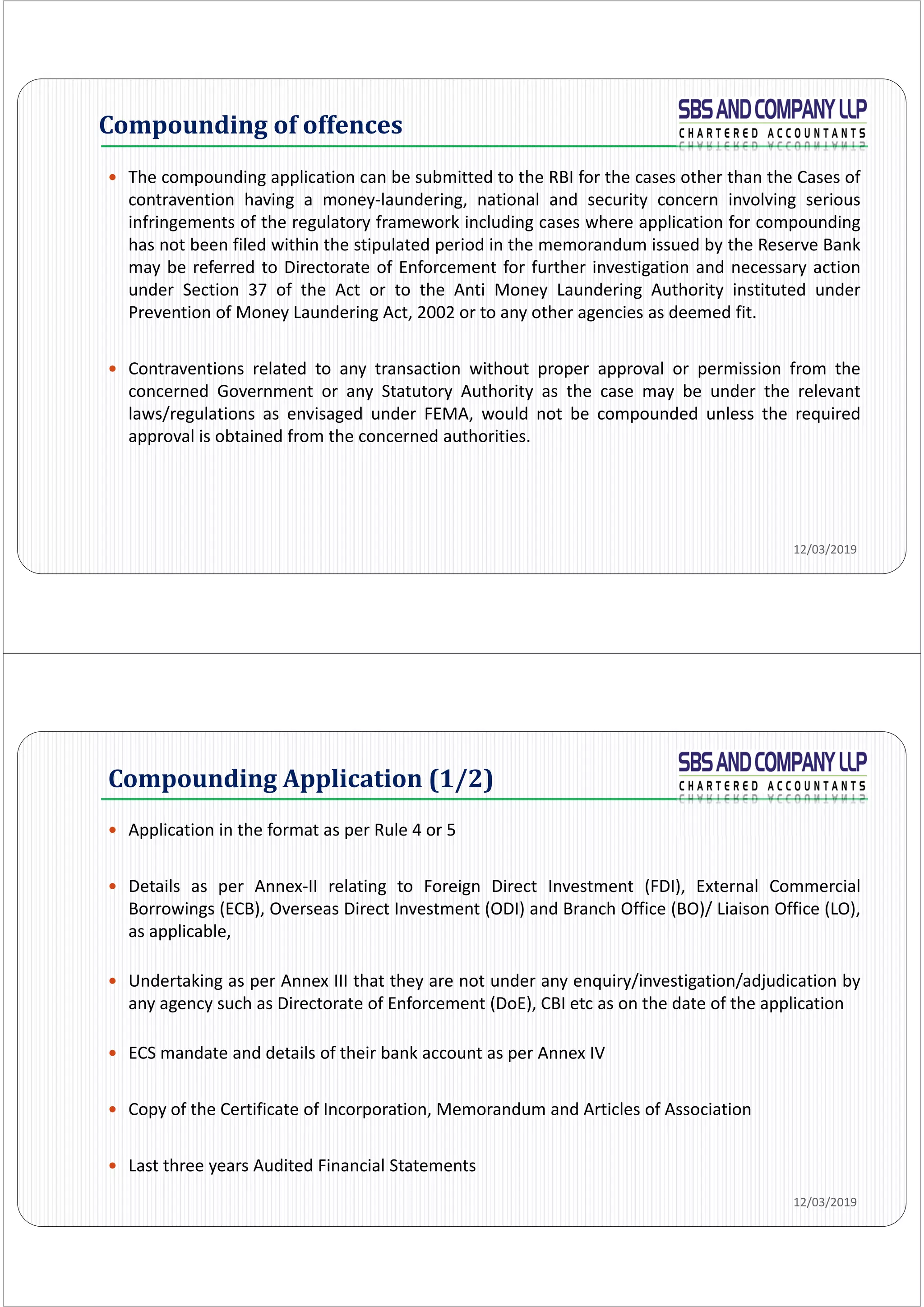
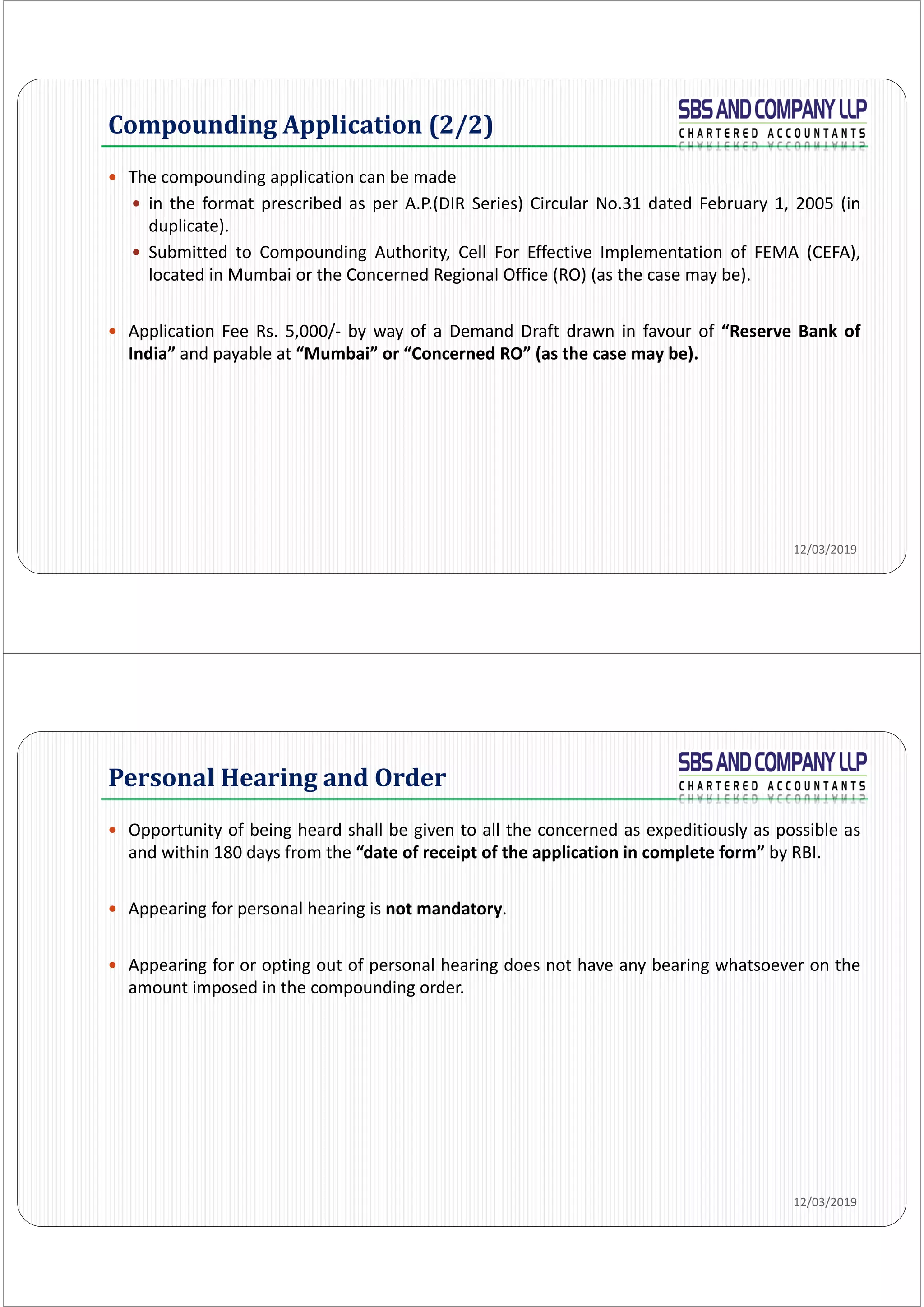
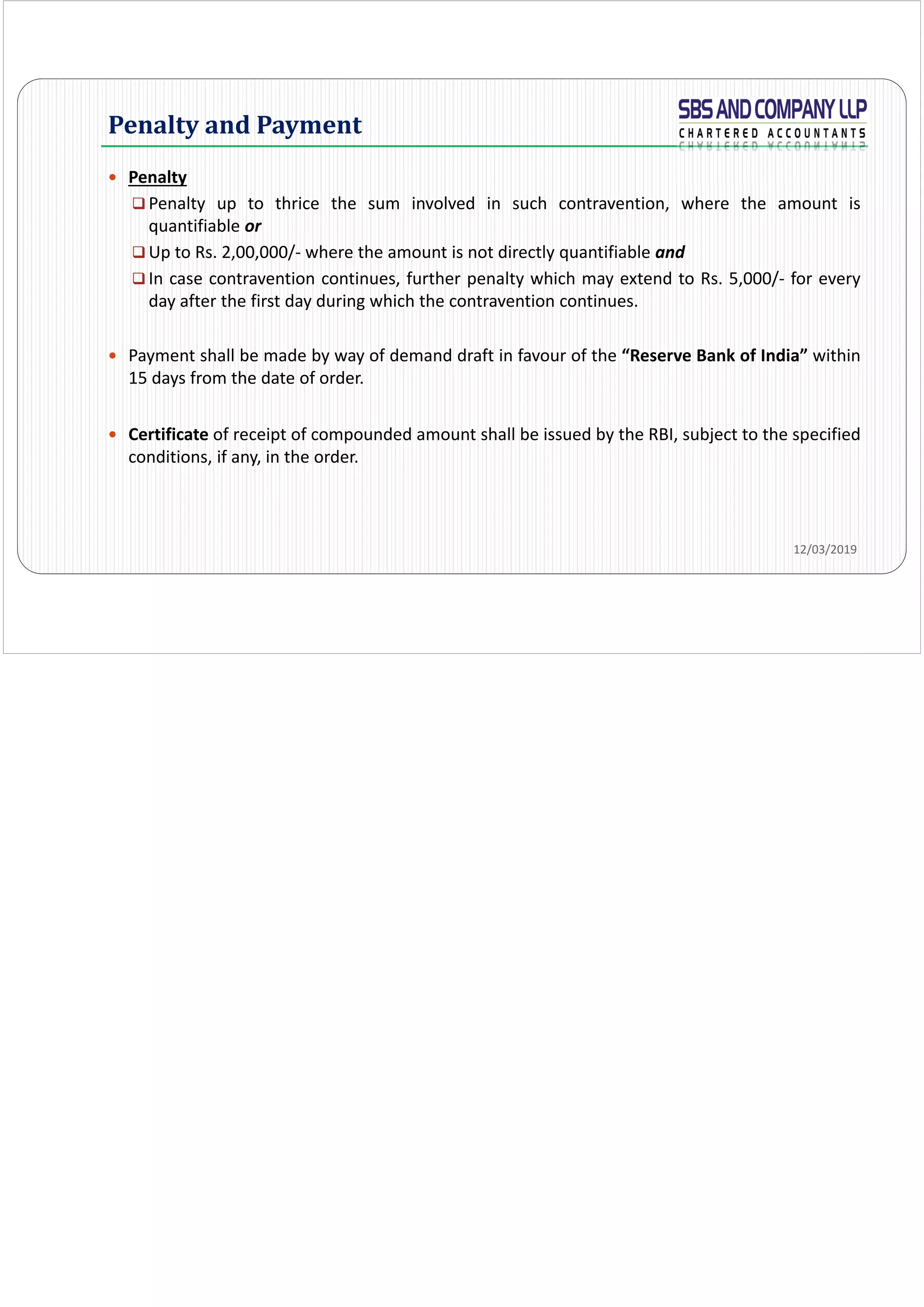


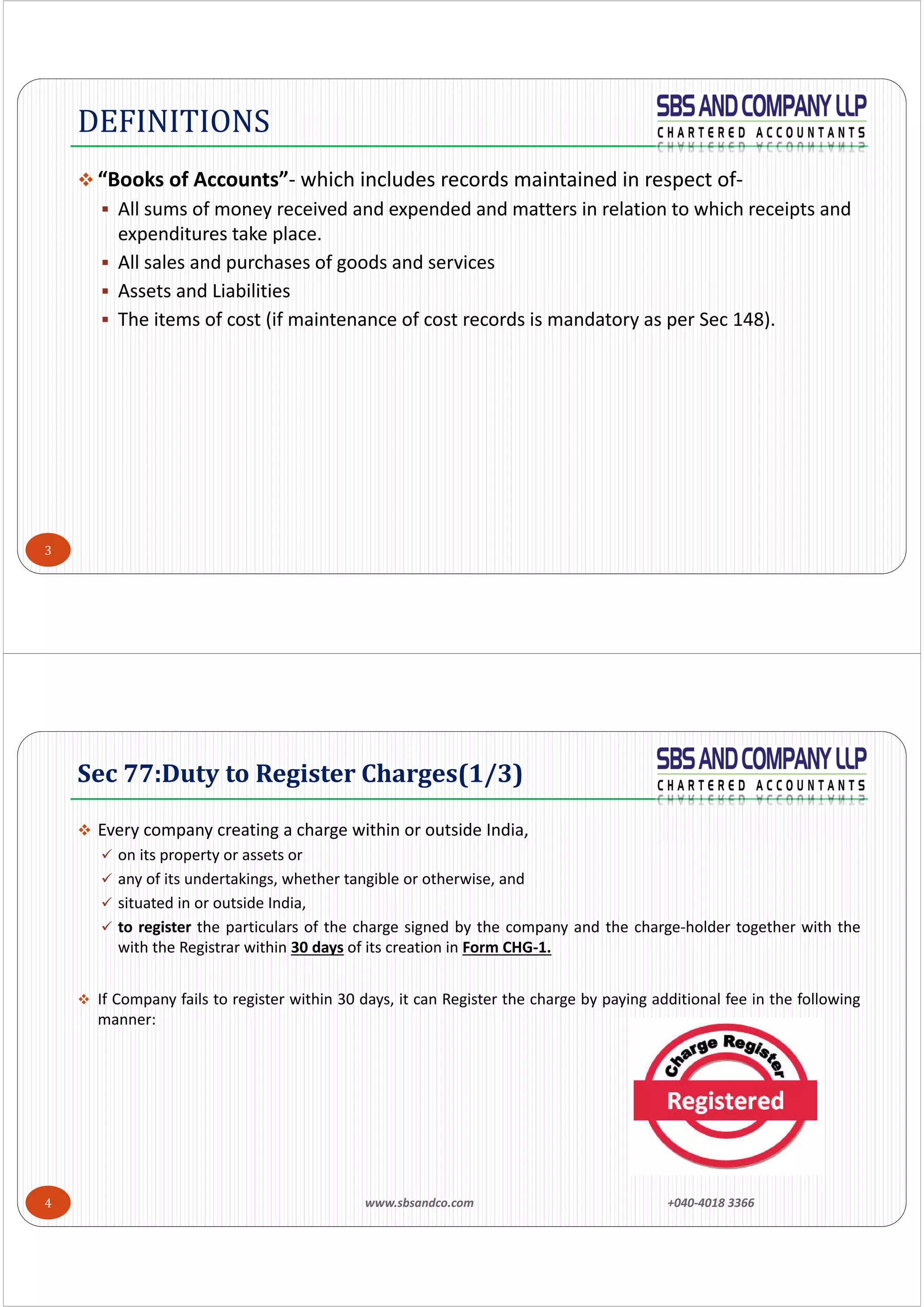

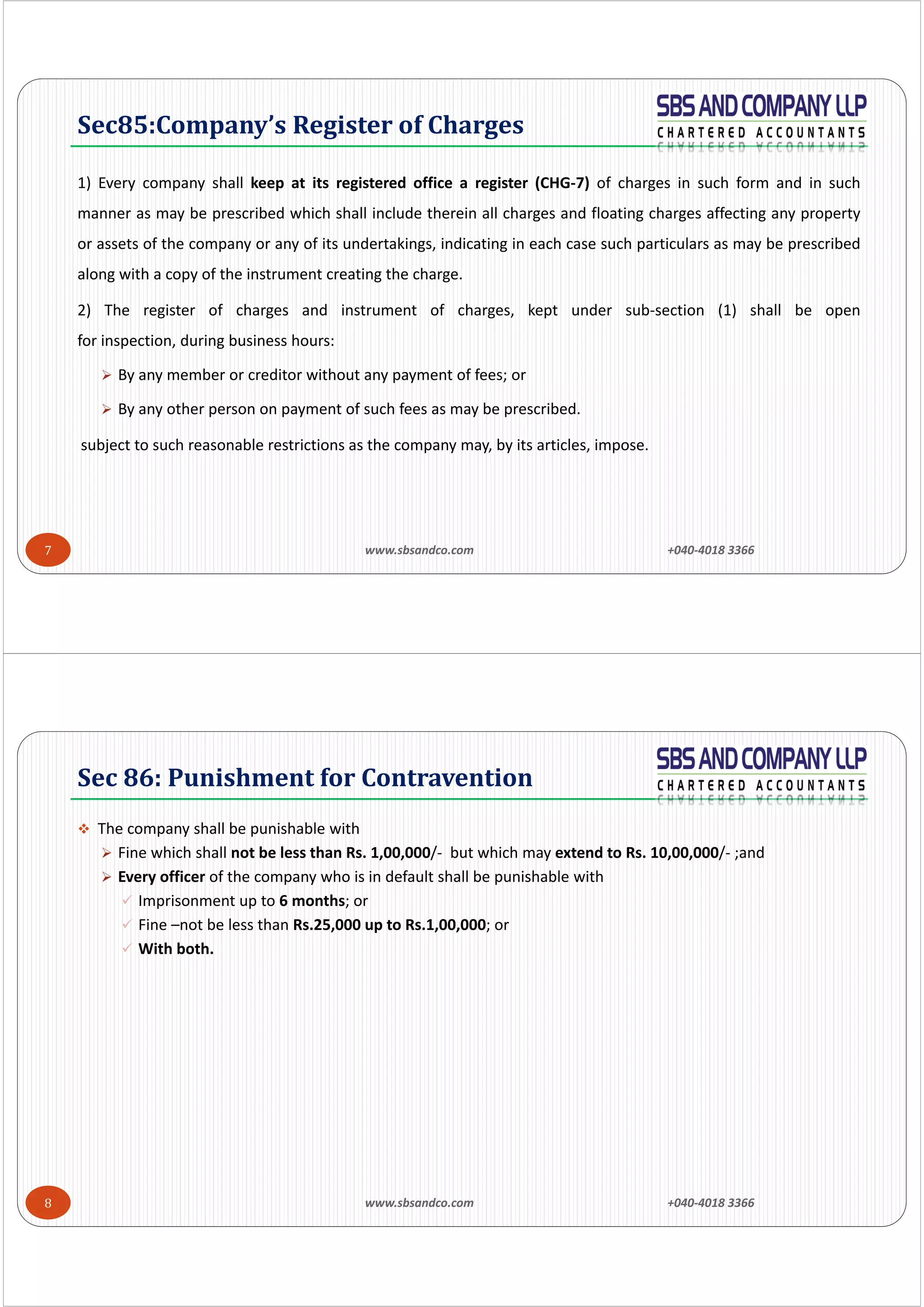


![13
Dividend shall be declared or paid by a Company for any FY only :
Out of the profits of the company for that year arrived at after providing for depreciation; or
Out of the profits of the company for any previous FY or years arrived at after providing for and remaining
undistributed; or
Out of both
Conditional Clause: In computing profits any amount representing unrealised gains, notional gains or
revaluation of assets and any change in carrying amount of an asset or of a liability on measurement of the
asset or the liability at fair value shall be excluded; or
Out of money provided by the CG or SG for the payment of dividend by the company in pursuance of a
guarantee given by that Government
Sec123: Declaration of Dividend (1/4)
14
Conditional Clause:
Company may, before the declaration of any dividend in any FY, transfer such percentage of its profits for
that FY as it may consider appropriate to the reserves of the company;
Company owing to inadequacy or absence of profits in any financial year, any company proposes to declare
dividend out of the accumulated profits earned by it in previous years and 7[transferred by the company to
the free reserves], such declaration of dividend shall not be made except in accordance with such rules as
may be prescribed in this behalf
No dividend shall be declared or paid by a company from its reserves other than free reserves.
No company shall declare dividend unless carried over previous losses and depreciation not provided in
previous year or years are set off against profit of the company for the current year
2) Depreciation shall be provided in accordance with the provisions of Schedule II.
Sec123: Declaration of Dividend (2/4)](https://image.slidesharecdn.com/sameekshavolume01march-2019-190321012904/75/Sameeksha-volume-01-march-2019-75-2048.jpg)
![15
The Board of Directors of a company may declare interim dividend during any FY or at any time during the
period from closure of FY till holding of the AGM out of the:
Surplus in the profit and loss account; or
Out of profits of the FY for which such interim dividend is sought to be declared; or
Out of profits generated in the FY till the quarter preceding the date of declaration of the interim dividend
In case the company has incurred loss during the current FY up to the end of the quarter immediately preceding
the date of declaration of interim dividend, such interim dividend shall not be declared at a rate higher than the
average dividends declared by the company during the immediately preceding 3 FY.
The amount of the dividend, including interim dividend, shall be deposited in a scheduled bank in a separate
account within five days from the date of declaration of such dividend.
Sec123: Declaration of Dividend (3/4)
16
No dividend shall be paid by a company in respect of any share therein except to the registered shareholder of
such share or to his order or to his banker and shall not be payable except in cash.
Provided that nothing in this sub‐section shall be deemed to prohibit the capitalisation of profits or reserves of a
company for the purpose of issuing fully paid‐up bonus shares or paying up any amount for the time being unpaid
on any shares held by the members of the company.
Dividend payable in cash may be paid by cheque or warrant or in any electronic mode to the shareholder entitled
to the payment of the dividend.
A company which fails to comply with the provisions of Sec 73[ Prohibition of acceptance of deposits from
public] and Sec 74[Repayment of Deposits, etc.,] shall not, so long as such failure continues, declare any
dividend on its equity shares.
Sec123: Declaration of Dividend (4/4)](https://image.slidesharecdn.com/sameekshavolume01march-2019-190321012904/75/Sameeksha-volume-01-march-2019-76-2048.jpg)




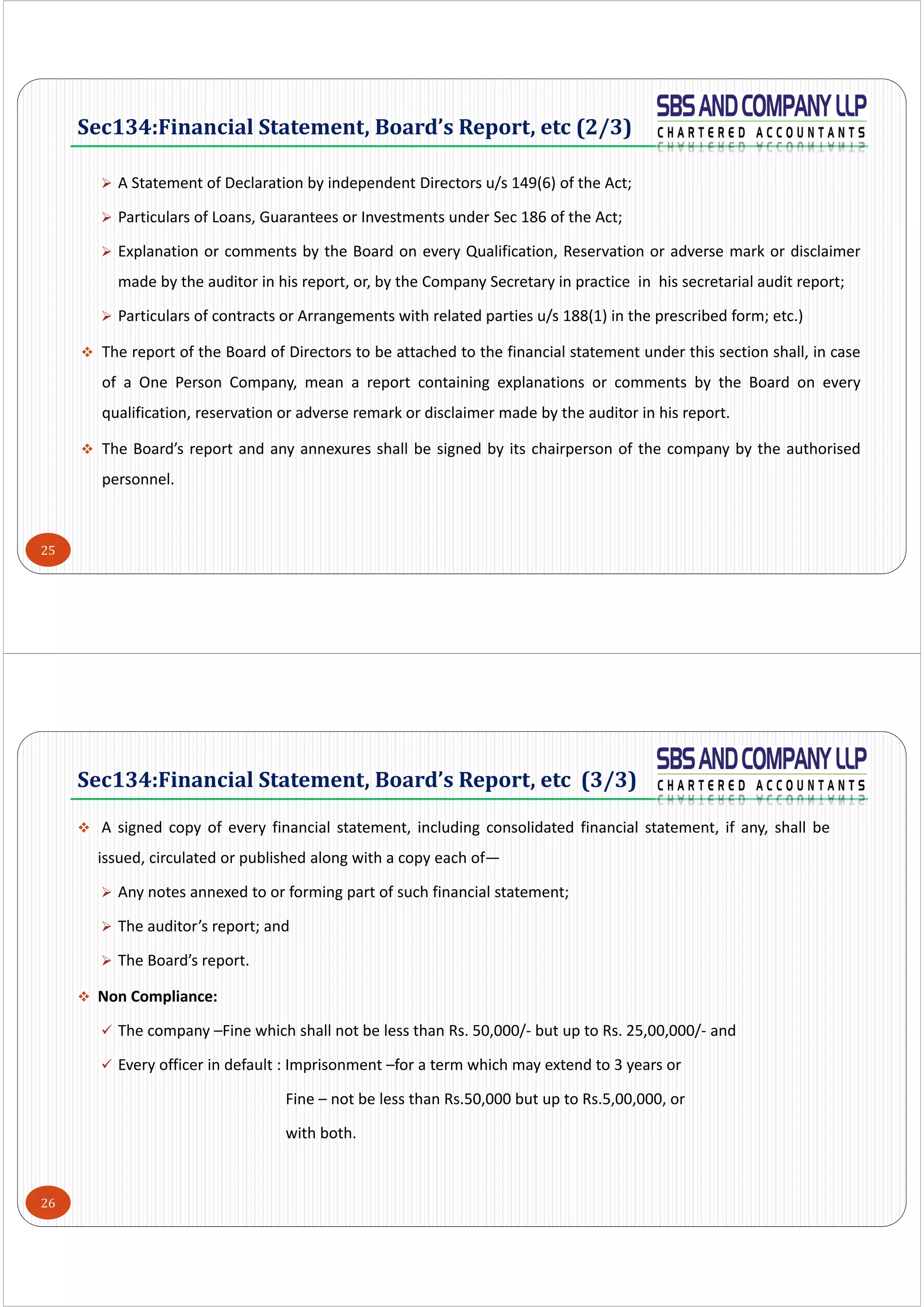
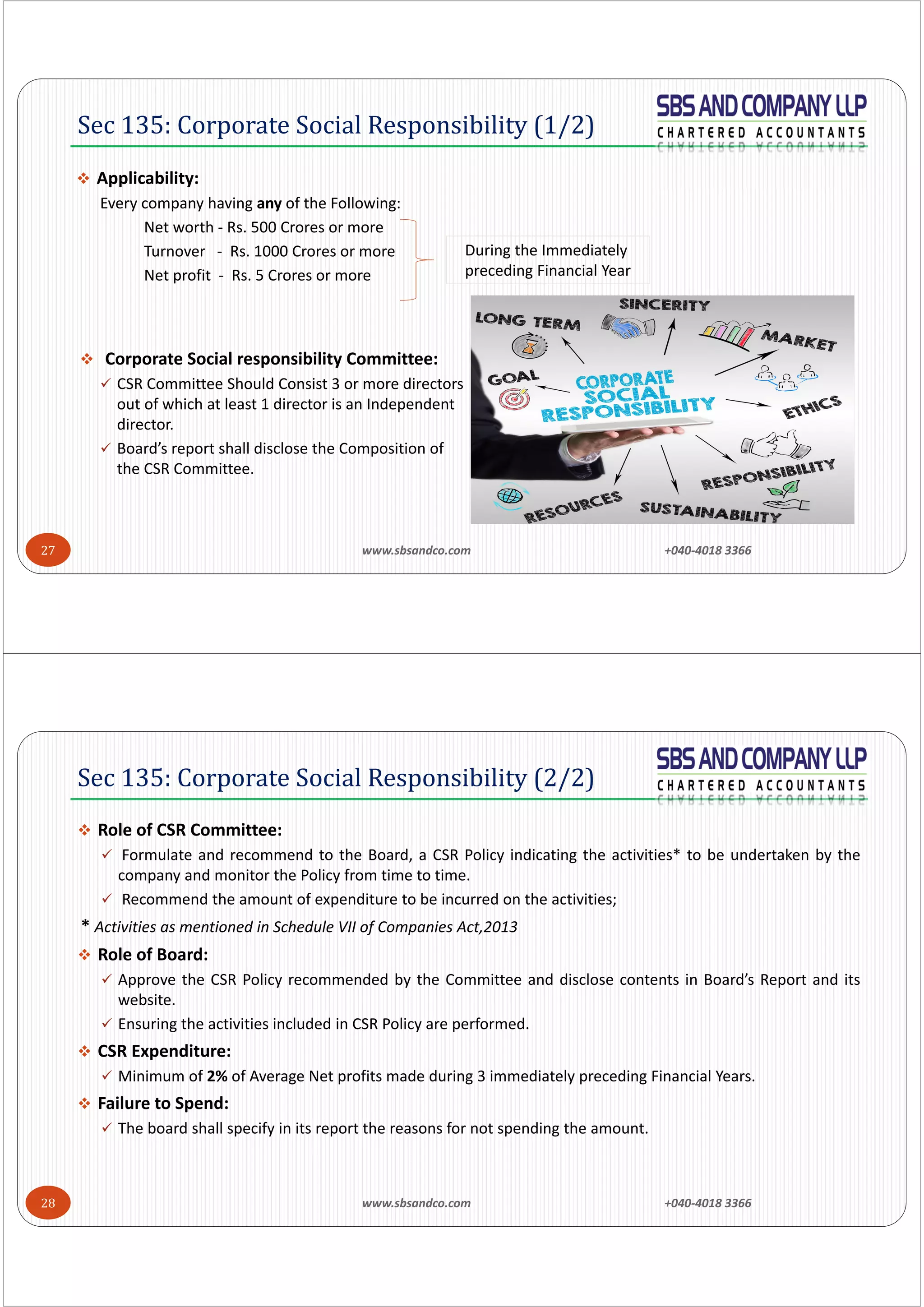
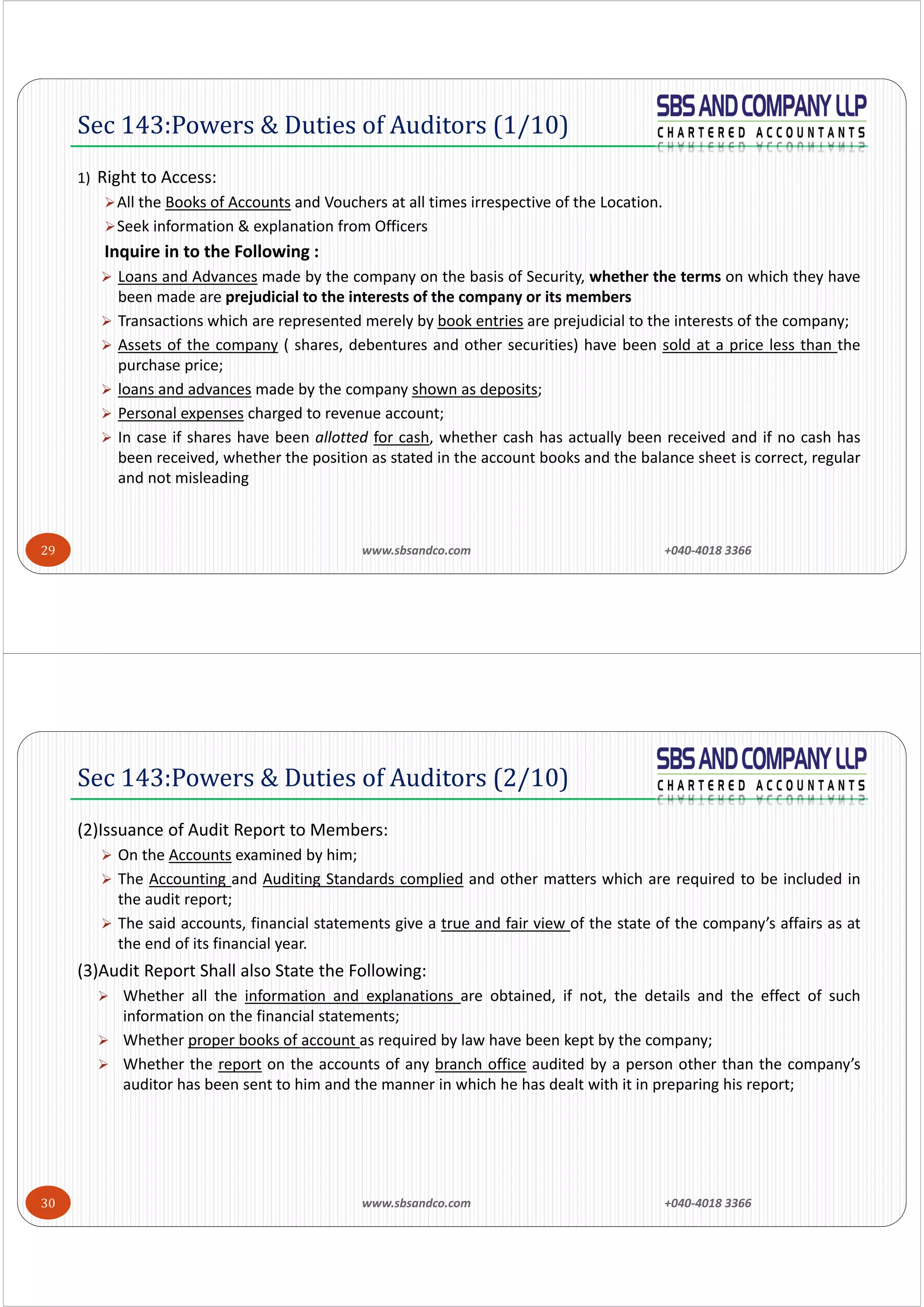








![47
2) In case the Auditor contravenes any of the provisions of Sec 139, Sec 143, Sec 144 and Sec 145, the auditor
shall be punishable
Fine ‐ not less than Rs. 25,000/‐ but which may extend to Rs. 5,00,000/‐ ; or
4 Times of the Remuneration of the Auditor, whichever is less [ Amendment w.e.f from 9th February
2018]
if an auditor has contravened such provisions knowingly or willfully with the intention to deceive the company
or its shareholders or creditors or tax authorities,
Imprisonment – up to 1 year; and
Fine ‐ not less than Rs. 50,000/‐ but which may extend to Rs. 25,00,000/‐
(or)
8 Times the Remuneration of the Auditor, whichever is less. [ Amendment w.e.f from 9th February
2018]
Sec147:Punishment for Contravention (2/4)
48
3) If the auditor contravened such provisions knowingly or willfully : he needs
i. To refund the remuneration received by him to the company; and
ii. Pay for damages to the company, statutory bodies or authorities or to members or creditors of the
company [ Amendment w.e.f 9th February 2018] for loss arising out of incorrect or misleading
statements of particulars made in his audit report.
4) The Central Government, shall by notification, specify any statutory body or authority or an officer for
ensuring prompt payment of damages to the company or the persons under clause (ii) of sub‐section (3) and
such body, authority or officer shall after payment of damages to such company or persons file a report with the
Central Government in respect of making such damages in such a manner as may be prescribed in the said
notification.
Sec147:Punishment for Contravention (3/4)](https://image.slidesharecdn.com/sameekshavolume01march-2019-190321012904/75/Sameeksha-volume-01-march-2019-92-2048.jpg)
![49
5) In case of audit of a company being conducted by an Audit Firm, the partner or partners shall be
jointly and severally punishable for the acts committed in fraudulent manner, the liability may be
whether civil or criminal as provided in this Act.
[Amendment w.e.f from 9th February 2018 – In case of any criminal liability of an Audit Firm, the
liability other than fine, shall devolve only on the concerned partner or partners, who acted in a
fraudulent manner or abetted or, as the case may be, colluded in any fraud]
Sec147:Punishment for Contravention (4/4)
www.sbsandco.com +040‐4018 3366 50
Board Meeting :
First Board Meeting ‐ within 30 days from the Date of its Incorporation
Minimum No. of Board Meetings ‐ 4 in a year (Calendar year)
Time Gap between Meetings ‐ not more than 120 days
Exceptions:
Sec 8 companies – At least 1 Meeting for every 6 Months in a Calendar Year;
Specified IFSC Public Company ‐
First Board Meeting shall be within 60 days from the date of its incorporation;
At least 1 Meeting in each half of the Year
A One Person Company, small company and dormant company ‐ At least 1 meeting in each half of
a calendar year and the gap between the two meetings is not less than 90 days
Sec 173: Meetings of Board (1/2)](https://image.slidesharecdn.com/sameekshavolume01march-2019-190321012904/75/Sameeksha-volume-01-march-2019-93-2048.jpg)




